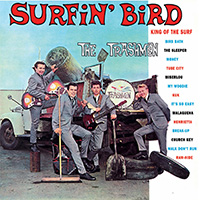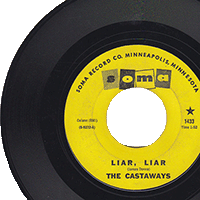Texas Bill Strength: Early Career
TEXAS BILL AND THE GUITAR
So how did a man born and raised in Alabama become “Texas Bill?” Jimmie Rodgers notwithstanding, there really were no cowboys in Alabama, so he moved to Houston. This in itself is a mystery. In 1942, at the age of 14, his parents and his brother Albert were living in Birmingham. Where did TBS go to school? He reportedly attended ROTC – where was that? In a 1945 directory he was listed as living with his parents in New Orleans. But sometime after August 28, 1944, at age 16, he was in Houston. We may never be able to explain his movements during these years.
And for that matter, how did he learn to play the guitar? Son Dale asked him that question once. The answer was not the romantic scenario of taking lessons from some black bluesman in New Orleans – he just learned by ear. “Hell son, there’s only 12 notes, how hard can it be?” Dale took that advice to heart and became a professional guitar player himself, self taught.
1944
THE JOY THEATER, HOUSTON
Family lore is that TBS won an amateur talent contest at the Joy Theatre in Houston at the age of 16. A search through the Houston papers doesn’t give up any evidence or details about the contest.
National Hillbilly News columnist Norma Winton wrote in 1949 that, in remembering that episode, Bill said, “My Mother thought for sure I was dying, and I can’t say what the old man said.”
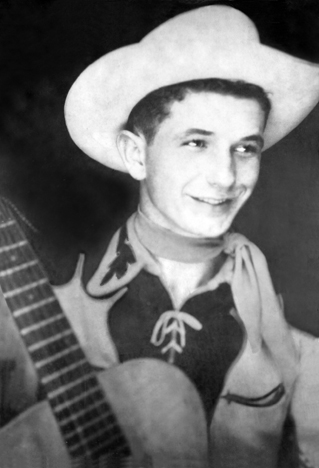
The theater had been called the Crown Theatre, stood dormant for most of the 1930s, and reopened in 1937 as the Joy, known for a time as the Joy-Tex. (Cinema Houston: From Nickelodeon to Megaplex, by David Welling). All of the references found in the Houston Chronicle (albeit classified ads for help) cited the Joy Theatre.
The people at CinemaTreasures.com describe this now-demolished theater:
Not one of the Houston’s finer show places, this bottom rung, second-run showplace was located at 303 South Main. A haven for Republic westerns, B-movies, and Columbia serials, the Joy Theatre was notorious for running exploitation films and holding late night burlesque shows on weekends.
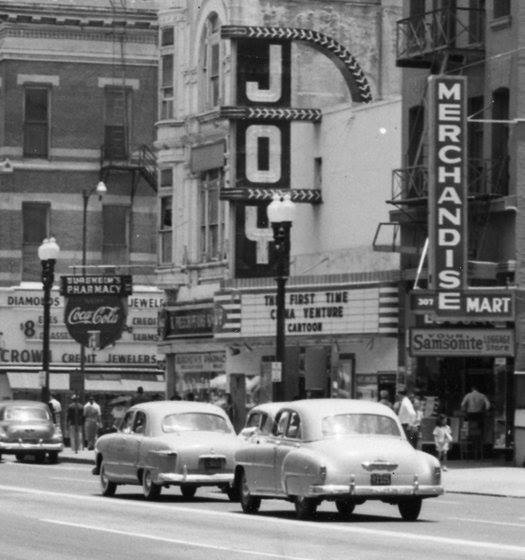
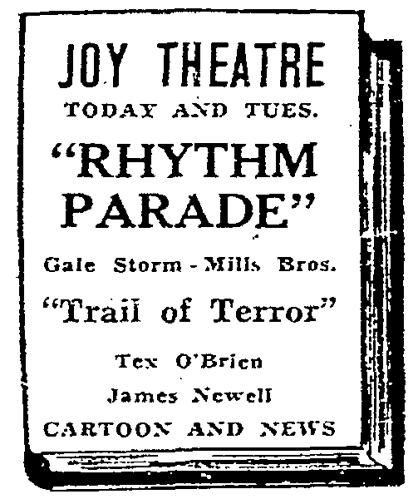
KTHT
As a result of this talent show win, the article below tells us that TBS got a job at Houston radio station KTHT at the age of 16. A look at the Houston Chronicle says that KTHT was started up by a County Judge who was forced to give up his position before the FCC would give him a license. The station went on the air with skeleton programming on July 28, 1944, and became an affiliate of the Mutual Broadcasting System on September 1, 1944. Although most of the programming came from Mutual, there were other shows that TBS could have participated in, such as “The Texas Cowboys” and “The Bar X Cowboys.”
1945
NEW ORLEANS
The 1945 New Orleans directory lists Bill, Jr. and his parents living at 857 Magazine Street. Bill’s father was listed as “Delta ship building.”
ST. JOSEPH, MISSOURI
October 1945
The first article about Texas Bill that comes up in a search in Newspapers.com is dated October 12, 1945, and is in the St. Joseph, MO, Journal. This article is important enough to quote in full:
New Entertainer Appears Daily on Station KFEQ
Texas Bill is one title in radio that is more than a stage name, because KFEQ’s Texas Bill Strength is really from down the Texas Trail. He was born in Bessemer, Ala., and after the right doses of schooling and R.O.T.C., took off for the Lone Star State, with his guitar under his arm. He first played and strummed his gitfiddle on the stage of the Joytex Theatre, in Houston, where he won first prize in a stage contest. This got him a job with radio station KTHT, in Houston. And so the radio bug got him.
Texas Bill is now on his way to bigger and better things, even Hollywood, if he can get the breaks. But, Bill isn’t the type to sit back and wait for the breaks to come to him. He’ll make them for himself by trying to do his best along as many lines as possible every single day. He even composes lots of the songs he sings on KFEQ, and hopes to get some of those songs of his recorded one day soon.
Next to music, Texas Bill probably likes girls and food best. He likes to dance, and always wants to learn some new step. He’s five-feet eight, has brown eyes, dark, curly hair, and add to all this his real Southern drawl, and you see what we mean. Texas Bill Strength is heard over KFEQ Monday through Saturday at :15 (sic) a.m. and 11:45 a.m., at 1:30, 2:00, 3:30, and 4:15 p.m., and Sunday morning at 9:45.
His reason for leaving Houston was addressed in a later interview, when he said, “I was just a kid and had the roving fever.” (Ronnie Pugh) A published letter revealed that at KFEQ he did 34 broadcasts weekly, although in those days a show could be as little as 15 minutes.
December 1945
On December 12, 1945, TBS was part of Deb Dyer’s radio show, which took place at the City Hall Auditorium in Chillicothe, Ohio. An article in the Chillicothe Constitution Tribune had a big come-on, saying that “Not only is this a big revue, but prizes will be given to the oldest woman in attendance, the youngest baby, the largest family present and other.” The facts about TBS were a little fast and loose:
Some of the features are: Texas Bill Strength of Houston, Texas. He formerly worked on the Southern Network from KTRH of Houston but is at KFEQ in St. Joseph, Missouri now. Texas Bill is a real Texas cowboy. His home is Houston, Texas, where he lived his entire life before coming to St. Joseph. He is one of the most popular singers on the radio today. He has a southern drawl, a deep baritone voice and, when he stars strummin’ his guitar, you are in for a real treat.
Other acts on the bill were:
- Lexie Lou, Queen of the Yodeling Cowgirls
- The Miller Sisters
- Vincent Westoff
- Swede Johnson
- The Milk Maid Trio
- Uncle Abe, the Fiddler
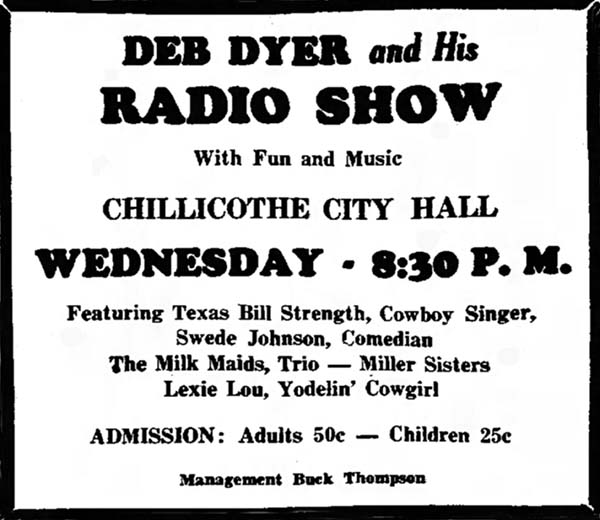
The next day’s news reported that snow kept the crowd small, but manager Buck Thompson said that the troupe would return again.
1946

May 1946
The May 1946 issue of National Hillbilly News included a brief write-up about TBS by long-time Ernest Tubb Fan Club President, Norma Winton. At that time, TBS had just finished working at KFEQ in St. Joseph, Missouri. The note said that “His popularity was such over KFEQ that he was being sponsored over 17 other radio stations at that time.”
While working at station KFEQ that May, he traveled to KXEL in Waterloo, Iowa, to look for a job. Unfortunately the owner of KXEL was a brother of the owner of KFEQ, so KFEQ fired him.
MEETING ERNEST TUBB
Soon after he lost his KFEQ job in St. Joseph, he got the chance to meet his idol, Ernest Tubb, at a concert in Fort Dodge, Iowa. He hitchhiked 300 miles to the show and was elated and scared when Tubb put him on as an opening act before the 12,000-person crowd. “Ernest dressed me up in one of his suits – boots and hat and everything. It just fit me … that was my first big show date.” (Ronnie Pugh)
Although not a permanent position, TBS sang for a while at KSOO in Sioux Falls, South Dakota. (Ronnie Pugh)
In the April/May 1946 issue of Melody Trails, Ernest Tubb Fan Club President Norma Winton reported that TBS had written 27 songs but hadn’t yet cut any records. She also reported that:
Texas Bill Strength is no longer at KSOO, Sioux Falls, but is now out in some might swell country – Denver, Colorado … At this writing, Bill isn’t on the air regularly, but is waiting for his Union transfer, and resting up a bit. (Ronnie Pugh)
July 1946
In her “Just Driftin’” column in the July 1946 issue of National Hillbilly News, Norma Winton noted that he was working in Colorado (KMYR in Denver) and making personal appearances throughout the area. In her “Radio Programs and Cowboys” column in the same issue, she mentioned that Texas Bill had presented her with a special recording of her favorite tune at the time, “Yesterday’s Tears,” along with several of his own compositions, including “Please Don’t Ever Forget Me” and “Louisiana Lou.” But he may have been longing for his Southern roots, as Norma noted that he was talking about the cold weather and how hard it was for a Southern boy to cope with it. While he may have complained about it, he was doing well at the time and Norma was envious that he was able to work there since she was a native of the state.
August 1946
On August 28, 1946, TBS turned 18 and filled out his Military Registration Card. He listed his address as Station D, Box 184, St. Joseph, MO, but noted his occupation as “Exemployed” – no doubt because of his misadventure with KFEQ. He described himself as 5’9″ tall, hazel eyes, brown hair, with a light brown complexion. His mother Jessie was given as his next of kin; her address was given as Magazine Street in New Orleans. Bill’s parents were listed in the New Orleans directory in 1946, as they were in 1945.
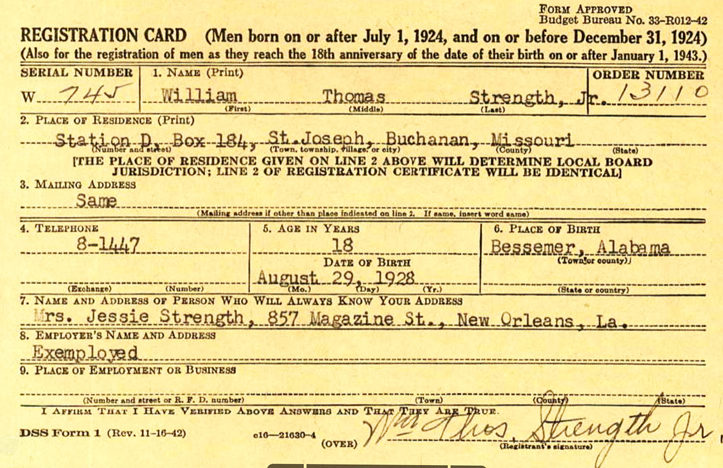
MELODY TRAIL RIDERS
September 1946
In September and October 1946, TBS was the star of the new band, the “Melody Trail Riders.” That we all agree on. Three sources give slightly different versions of this story.
In the September 1946 issue of Melody Trails, Miss Norma Winton reported that TBS was working as the star of her new band, the “Melody Trails Riders,” in Fort Smith, Oklahoma. “You’ll be seeing and hearing a lot of Bill in the future.”
On October 3, 1946, the Sallisaw, Oklahoma, Democrat American reported that the band was managed by Miss Winton and led by TBS. It had recently entertained in the Roland High School Auditorium on Friday night, September 27, 1946. Members of the show included Jack and Audrey Manning, and Rusty Russell. Jack and Audrey were leaving for a radio job in Kansas City. “The rest of the gang and others will be around in your high school soon. Watch for them!”
October 1946
On October 12, 1946, Billboard again called TBS the leader of the “Melody Trail Riders,” as well as the emcee and the manager. The live program was described as a “new show that is proving popular with Fort Smith and Eastern Oklahoma folk song lovers.”
At present show consists of five pieces, and plans have been made to increase the number soon. In addition to Jack and Audrey and Rusty Russell, the list of performers cited by Billboard included Jackie Jackson and the Larson Sisters.
MEMPHIS
By the end of 1946, Bill’s career had taken him to Memphis, based on a letter to the editors of National Hillbilly News that listed his PO Box as being in Memphis.
November 1946
TBS, playing the Rainbow Gardens, Memphis, is heard over WHHM. (Billboard, November 16, 1946)
National Hillbilly News columnist Norma Winton reported that in the early days, Texas Bill was also writing tunes such as “There’s Always Two to Blame,” “I’m Lonely Since You’ve Gone,” and “You’ve Left Me Behind.”
In the latter part of 1946, Floy Case reported in her column that TBS had a six-piece western band and was making personal appearance in Missouri and Kansas. She noted that Bill was “…doing all right for himself in this hillbilly biz.” She also mentioned that he had written two new tunes, “The Rose of My Heart” and “Who’s Gonna Love Me Now.”
December 1946
In an article in the December 1946 issue of the Mountain Broadcast and Prairie Recorder, Floy Case told readers that Bill was the “singing emcee of Norma Winton’s band the “Melody Trail Riders.” Case described TBS as “…a young fellow who seems to be going places in a hurry.” Bill and the group were playing dates in the eastern Oklahoma and western Arkansas areas.
At some point before he met his first wife, TBS had a daughter by another woman.
1947
January 1947
Arlie Kinkade’s column, “This, That ‘n the Other” reported that he was working at WHHM in Memphis. (National Hillbilly News, January 1947)
Also in January 1947, Floy Case wrote that Bill was one fellow that “…gets around,” going from Texas to South Dakota and Colorado. She mentioned that he had been working as part of Norma Winton’s band, the Melody Trail Riders, out of Ft. Smith, Arkansas, but had since formed his own band, the “Ranch Ramblers,” and was working regularly at the Rainbow Gardens in Memphis. She, like many of the columnists back then who also dabbled in songwriting, then mentioned that Bill had been plugging a song she had written with Jimmie Davis, “I’m Beginning to Forget You,” that had also been recorded by Ernest Tubb.
A 1952 article mentioned that in 1947, Bill toured with several large road shows then and did stints at KMYR in Denver, KSOO in Sioux Falls, KMA in Shenandoah, Iowa and KRLD in Dallas.
BACK TO HOUSTON
July 1947
Although he is not named on the radio listings until 1948, it could very well be that he was anchoring the “Ranch Hand” program on KATL, as early as May 11, 1947. He is identified as “Ranch Hand” in the 1948 ads below.
December 1947
A 1951 article in Cowboy Songs magazine said that Bill had gone back to Houston in 1947. Evidence of this is in an article in the Houston Chronicle dated December 11, 1947, where he is named as a participant in a floor show at the Plantation. The show was a benefit to buy a jeep for “crippled children.” He is identified as “Bill Strength, radio singer.”
1948
A 1948 Houston directory listed Bill’s address as 504 Aurora. This was the home of his wife Dorothy’s parents. His occupation was given as KATL.
1948 was a busy one in Houston, where he worked at three different radio stations
January 1948
Foremost Dairies offered TBS a 15-month contract to do a morning show called “Ranch Roundup” on a new 5,000 watt station, KLEE. KLEE, located in the Milby Building, went on the air on January 31, 1948, and TBS could have been included in what the Houston Chronicle called “Hillbilly Program.” He was listed under his own name from April 16 to July 31, 1948.
May 1948
In May he had an evening disc jockey program over radio station KATL.This show was 15 minutes long. (Ronnie Pugh reported that this show was called “Texas Music for Texans,” but local radio listings show it under his name. A show by that name only appears in a search for a few months in 1949.) This unusual arrangement seems to have lasted only during his tenure at KATL, which appears to be May 11 to July 31, 1948.
Ronnie Pugh also says that he sang on a third Houston station, KNUZ. This could not be confirmed by radio listings, but the show may not have been under his name.
Ronnie Pugh describes the radio shows:
- Each show was heavy on cowboy songs, as those titles and one ad makes clear: “Gather round all you good neighbors who like your western songs with that true Texas flavor! Just relax and let Texas Bill throw those ropin’ rhythms your way. They’re guaranteed to please ya plenty podner.
- He performed at night clubs.
- He guested on a new barn dance show, “The Houston Hoedown Club.”
- He immersed himself with personal appearances in the Houston area.
These personal appearances in 1948 identified him as the “F and M Ranch Hand.”
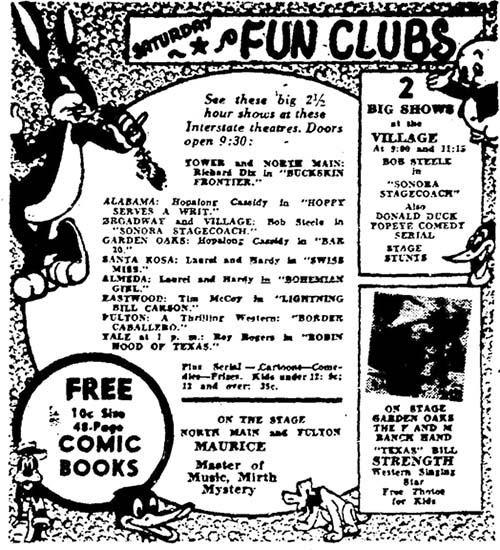
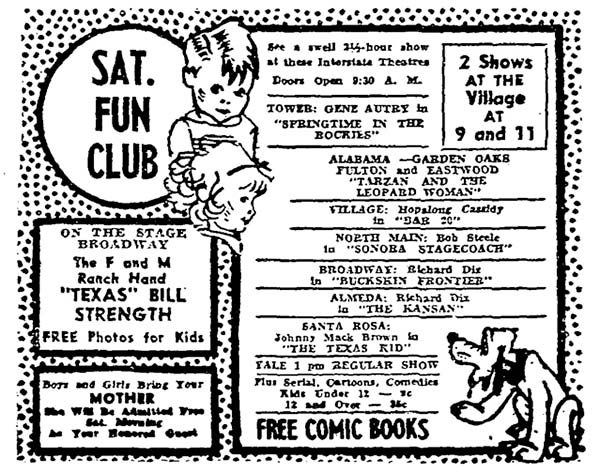
WIBB
This is a shot in the dark, but an article on the history of station WIBB in Macon, Georgia, states that it went on the air on November 18, 1948. Although it was just a daytimer with two stations as competition, the article states:
But slowly, through the appeal of such personalities as Johnny “The Bullfrog” Hamrick, “Texas” Bill Strength, and Jimmie Layfield, who played his Hammond electric organ over the airwaves Sundays through Thursdays, the station carved out a respectable following by catering to a wide audience. (The Macon Telegraph, May 31, 1998).
Other than WIBB being one of the stations that carried his CIO program (see January 1950), there is nothing in his previous biographies that indicate that Bill ever worked in Macon, but apparently he did in 1948/1949, at least for a little while. Bill wasn’t known for staying in one place for very long in these early days.
1949
CIRECO RECORDS
Bill’s first recordings were apparently made in Houston on Cireco Records. Seven sides were cut at the session. It appears that Bill played on all of the sessions; the lead singers were both Texas Bill and Jerry Irby.
Two 10 inch records were released:
Cireco 101, with both sides credited to Jerry Irby and his Texas Ranchers:
- “You Can’t Take it With You”
- “Almost Every Time”
Cireco 102:
Side A: “49 Women” by Jerry Irby and his Texas Ranchers
Side B: “Little I and Big You,” by TBS and his Saddle Ranchers
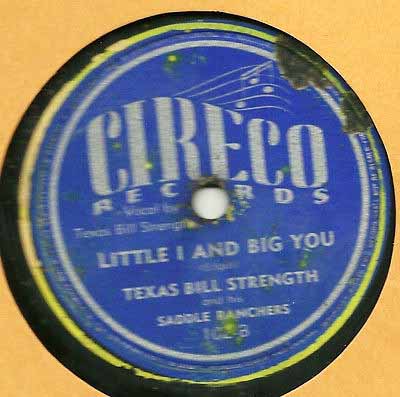
The other songs TBS and Irby recorded at Cireco in 1949, but were not released were:
- “Cowboy’s Sweetheart”
- “El Rancho Grande”
- “Buttons and Bows”
Frank’s notation indicates that the lineup for this session was:
- Jerry Irby and His Texas Ranchers [Gerald F. “Jerry” Irby] vocal, first rhythm guitar
- *Texas Bill Strength aka David Grey and His Texas Ranchers [William Thomas “Texas Bill” Strength] vocal, second guitar
- Unknown lead guitar
- Possibly Ernest “Deacon Evans, steel
- Peter ?, bass
- ? drums
- Anthony “Tony” Sepolio, fiddle
- Pete Burke, piano
- [vcl-2/gt], ? [ld gt], poss. Ernest “Deacon” Evans [steel], Peter ? [bass], ? [drums-7], Anthony “Tony” Sepolio [fiddle],“Pete” Burke [pno-6])
- How David Grey fits into this picture is anyone’s guess, unless that’s Jerry Irby’s real name.
February 1949
DOROTHY ALTMAN
On February 23, 1949, Texas Bill married Dorothy “Dottie” Altman in Houston. Dorothy was the seventh child of Joseph V. and Pearl Nona Altman.
Joseph Altman was born in Czechoslovakia on March 28, 1891 and came to the U.S. in 1910. By at least 1930 he lived in Houston, where he died in 1980.
Joseph’s wife Pearl was the daughter of John Nona, who was born in either Poland (or Germany,) depending on the year of the Census. Her mother Martha was also of Polish/German descent and was born in Texas or California, Pearl variously reported. Pearl was born in Chapel Hill, Texas on August 7, 1889. The 1900 Census indicates that her birth name may have been Peladio. In 1920 she lived in Austin on a farm with her brother Adam. Pearl died on March 26, 1952, at the age of 62. Her residence was the family home at 504 Aurora Street in Houston.
Joseph and Pearl’s children were:
- Albina “Bina” Krusleski (born in 1913)
- Wallace (1922)
- Josephine E (1925-2022) Married Edward Ludwig, then Michalak
- Paul A. (1923)
- Helen Mary (July 28, 1927) Roberts Waddell
- Lillie Frances (July 1929) Married Alan Hannuksela, then Enoch Allen Miles
- Dorothy L (born on January 6, 1931)
In a taped interview with her son Dale, Dorothy provided a great deal of information about how she and TBS met. At the time, Bill’s parents were living in New Orleans and Bill was living in Houston.
Dorothy met Bill after the Joy Theater talent contest, while he was playing at a nightclub in Houston. The club was owned by a friend of the Altman family. She may have been 16-17 yrs old. Four of the five Altman sisters (without Bina) would go to the theater to see the regular Sunday afternoon jam sessions, which he hosted, and they met there. At one point she went up to the table where TBS was sitting with a couple of other players with him that worked for the club. She “said hi and what not,” and sat down and started to get to know each other. She said that because a family friend owned the place “Big Momma” (Pearl Altman) trusted her little underaged kids there. The girls continued to come into the club on Sunday afternoon for a few weeks. He was playing for the “kitty.” After she got to know him better she would pass the hat around for him.
She continued that it was just natural that he would go to their house and meet their Mother. It was Bill’s idea – he didn’t have any family in town and they brought him home to have dinner with the family. Big Momma fell in love with him immediately. She used to “box his ears good” when he misbehaved. Dorothy said Pearl gave him the discipline he didn’t get at home. At various times, two other Strength boys, Charlie and Pete, would also stay with the Altmans, which didn’t set well with their mother Jessie, who thought Pearl was trying to take her boys away from her.
Bill and Dorothy were married by the clerk of the Harris County court. The ceremony was solemnized on March 13, 1949, by Rev. L.R. Pearson, Pastor of the North Main Baptist Church.
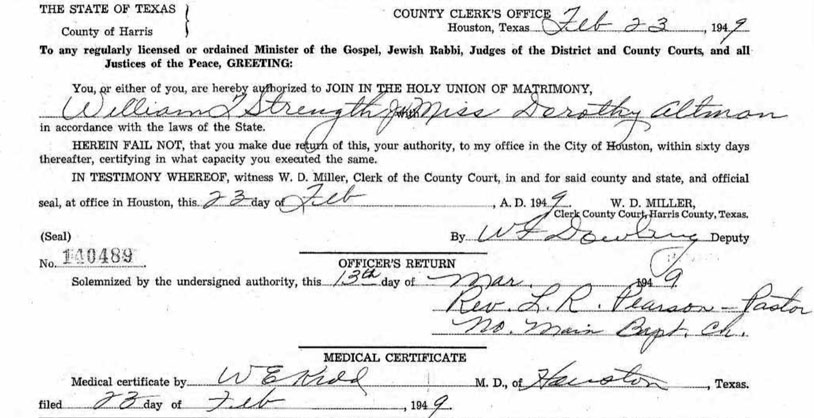
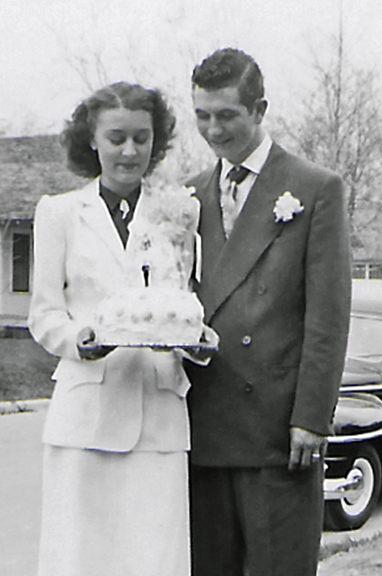
May 1949
4-STAR RECORDS
By May 1949, TBS had signed with 4-Star Records.
In May 1949 he recorded two sides:
- “If I Could Buy Your Love”
- “Please Don’t Ever Forget Me”
The record was released in December 1949, as TBS and His Saddlepals. It was issued as either 4-Star 1334 and/or 3176.
Billboard reviewed it on December 17, 1949:
- “If I Could Buy Your Love,” Western string ork [orchestra] setting and a straightforward but not especially strong vocal on a likely pop-Western piece.
- “Please Don’t Ever Forget Me,” Tune is machine-stamped out of a familiar die, with nothing special of its own. Rendition is plodding.
July 1949
Biff Collie, the “Bellerin’ Bowlegged Boy, who whirls wax at KNUZ, Houston, reports that rustic music is going great guns in his town. Collie, who does five hours of DJ’ing for folk music daily, is working closely with the Hoedown Club, local bistro which features such local and territory names as:
- Floyd Tillman (Columbia)
- Leon Payne (Capitol and Bullet)
- Ben Christian (4Star)
- Benny Louders
- Texas Bill Strength (4 Star)
On Thursday nights, the “Houston Hoedown Dance” brings together all the local bands, with over 1,000 dancers attending.
(Billboard, July 30, 1949)
September 1949
BIRMINGHAM
TBS and Dorothy moved to Birmingham, Alabama, in September 1949.
October 1949
In Birmingham, Texas Bill did daily radio programs at WRBC, which was part of a network of 37 stations throughout Alabama and Georgia. Listings are found in the Birmingham News starting on October 6 for an October 7 start date. He did a split shift from 12:30 to 1 pm and then 2:30 to 3 pm. Curiously, WBRC was an FM station, at 102.5 mc. Listings continued until October 29, 1949, announcing his regular hours on October 31, 1949.
GREENVILLE, ALABAMA
In late October, 1949, Bill received a job offer from WGYV, on the Alabama Broadcasting System in Greenville. The station had started up in August 1948.Greenville is located in south Alabama, just 122 miles from the ocean. The small town had 6,731 residents in 1950, and not many more today. He drove all night to be there by the morning of October 31. The station had rented an apartment for the couple, which included a pregnant Dorothy. Early that morning, when he left for the station, Dorothy asked to be dropped off at the hospital. Their son, Ernest Dale Strength, was born prematurely at the Speir Hospital. Dale was named after his father’s hero/mentor/friend, Ernest Dale Tubb. The family lived on Conecuh Street, which runs through the town.
Texas Bill worked for WGYV for two months.
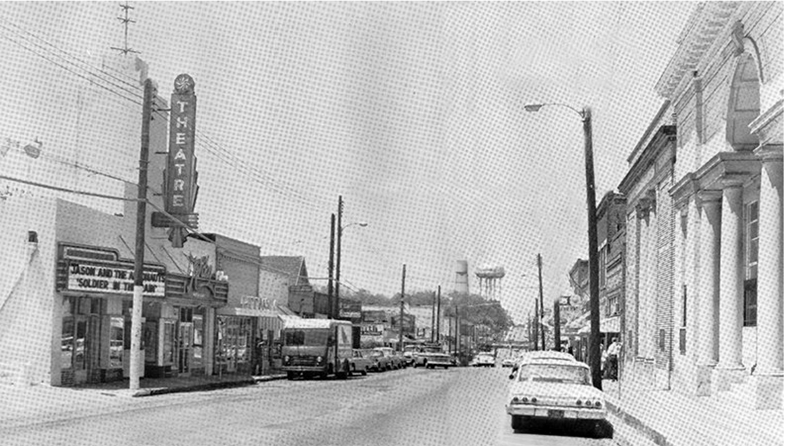
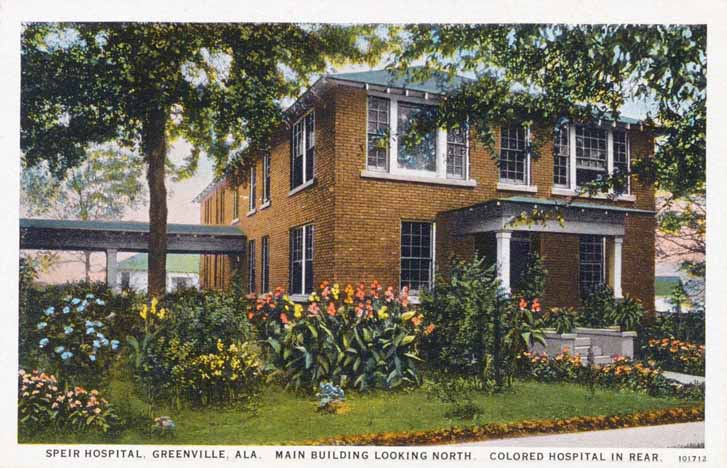
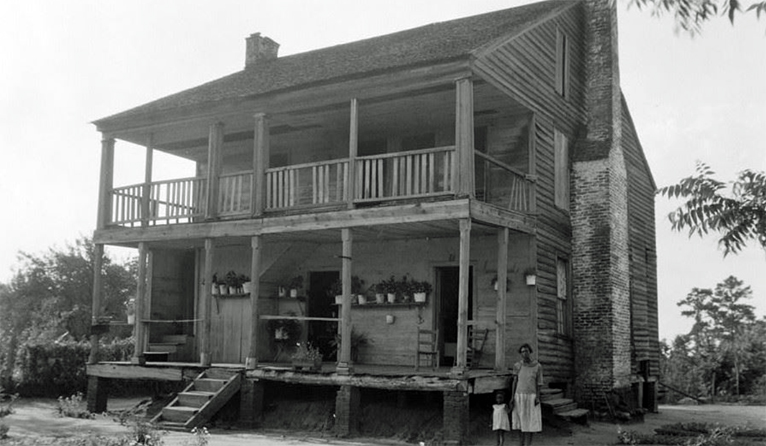
November 1949
The caption for the photo below reads:
“TEXAS” BILL STRENGTH,” now with WGYV, Greenville, is heard every morning at 5:30 and is master of ceremonies at the Saturday Night Jamboree. Bill also has several shows during the week. He is the author of several popular songs, including “Louisiana Lou,” “Please Don’t Ever Forget Me,” “Rose of My Heart,” “Im Still Lonely for You.” He started in radio in 1945 at KTHT, Houston, Texas, by winning an amateur contest, and has since been with 19 radio stations and has played with such famous names as Tex Ritter and Bob Nolan, Sons of the Pioneers. Bill has also recorded for Cireco Records. He is already a favorite with local radio fans.
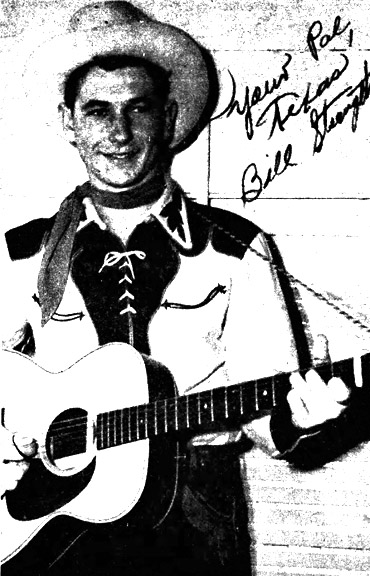
4-STAR RECORDS
In November 1949, TBS and His Saddlepals recorded two sides for 4-Star Records (1403) in Houston:
- “Actions Speak Louder Than Words”
- “Mr. Moon Sailing High”
There is no information of a release date and they do not seem to have been reviewed in Billboard.
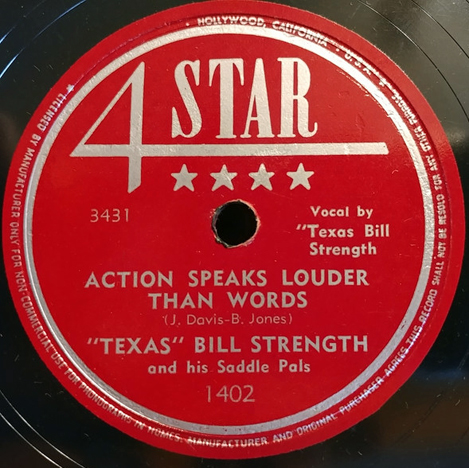
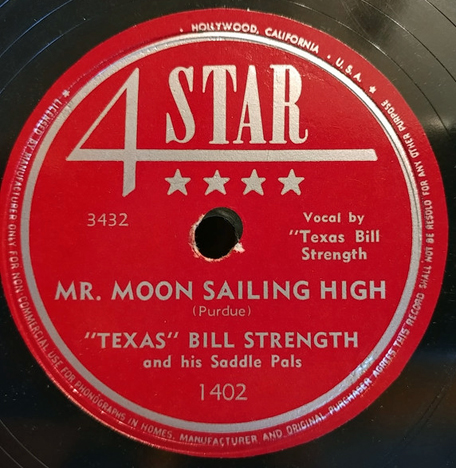
December 1949
TBS (4 Star) is doing a DJ shot over at WGYV, Greenville, Alabama. His show includes:
- The Greenville Bucheroos (sic)
- Andy Williams (apparently a Country Andy Williams)
- The Midnight Ramblers
- The Camellia City Ramblers
- Cousin Wilbur
- Charley and Honey Lou
(Billboard: December 17, 1949)
It was later clarified that Andy Williams was a separate act on WGYV and not part of Bill Strength’s show. (Billboard, January 21, 1950)
TBS is personally managed by Rudy Clark, Birmingham. (Billboard, December 24, 1949)
BACK TO HOUSTON
In his “Southwestern Round-Up” column for National Hillbilly News, Tex Moon wrote that in late 1949, Bill once again moved back to Houston.
He was supposedly one of the mainstays at a new venue in Houston where it was said, “The Best Bands of All Come to Hillbilly Hall.” Other performers at the venue included Floyd Tillman, Hank Lockwood, Leon Payne, Benny Leaders, Pete Hunter, the Texas Cowboys, and Woody Carter.
1950
January 1950
THE CIO
TBS took a job with the CIO on January 17, 1950. The first 15-minute program hit southern stations on Sunday, January 22, 1950. At first the program had no title, but later gained the name “American Folk Songs Featuring Texas Bill Strength.” (Ronnie Pugh)
The Congress of Industrial Organizations (CIO) was a federation of unions that organized workers in industrial unions in the United States and Canada from 1935 to 1955. TBS’s affiliation with the CIO was mentioned in a long column by Victor Riesel, which was syndicated in several newspapers simultaneously. It read:
To push its southern organizing campaign, the CIO will put “Texas” Bill Strength, popular disc-jockey and folksinger, on the air to send his ballads across a six-state network, covering Georgia, Alabama, South Carolina, North Carolina, Tennessee, Virginia, and parts of Texas. Between the ballads will be George Baldanzi, CIO southern chief, with speeches.
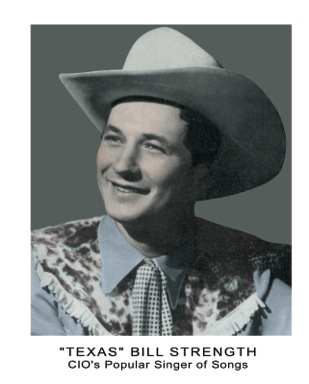
Emanating from WGST, Atlanta, TBS made radio transcriptions with Baldanzi, which were aired over 126 stations. At that time, the CIO had over 6.5 million members, so Texas Bill and his record label, 4-Star Records, took advantage of that and created a slogan for Bill,” …the Boy with 6 and a half million sponsors.”
The 1951 Cowboy Songs article notes that Bill was such a hit with his CIO job that he logged over 57,000 miles: traveling on tours, personal appearances, visiting those in hospitals and institutions, and attending union meetings and conventions for the CIO. Impressively, it was said that he entertained upwards of a quarter million people at each of those conventions. Like many artists, Bill shared the stage with many of the mainstays of country music in that era. But Bill also got to entertain some well-known political figures of the era due to his work with the CIO, including Vice President Alben Barkley, Senator Hubert H. Humphrey, Congressman Christopher of Missouri, and Secretary of Labor Maurice Tobin. See April 1950 for photos of Texas Bill with Senator Humphrey.
Some of the more well-known venues he appeared at were the Palmer House in Chicago; the “world’s largest auditorium” in Atlantic City, New Jersey; the Hotel Utah in Salt Lake City; the National Training School for Boys in Washington, DC; and the Hudson Manor in Tampa.
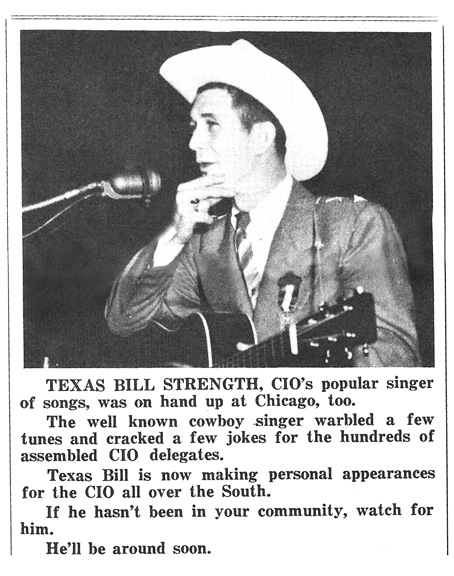
He also appeared on KWKH’s Louisiana Hayride in Shreveport.
None of the articles or ads found implied that TBS did anything but sing and/or entertain at meetings and conventions. The last mention of any CIO actions found was on February 7, 1953.
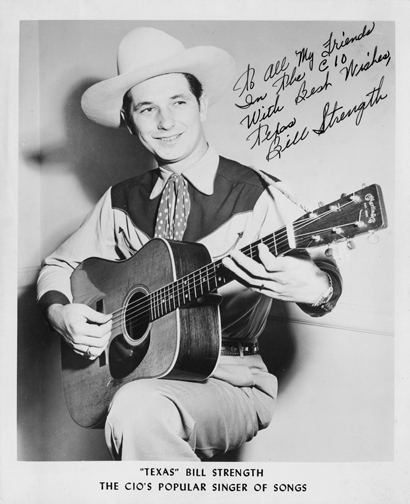
The ad below appeared in several Southern newspapers on January 20, 1950. An article in the Kingsport, Tenn., Times stated that the programs began on Sunday, January 22, 1950, and were heard from 1 pm to 2 pm. Presumably the programs were only heard on Sundays and not for the entire hour.
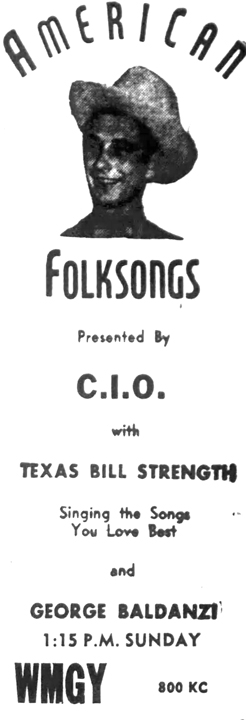
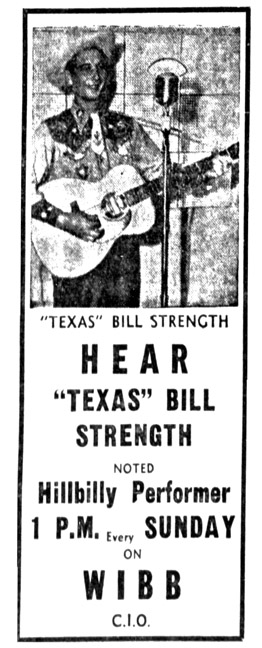
February 1950
TBS was to come to Macon, Georgia during the first two weeks of February, 1950, for public appearances for the CIO, reported the Macon News, January 20, 1950.
March 1950
March 11, 1950, Billboard:
The CIO is using hillbilly music as its major format in a new transcribed radio series thru the South. Since January 22 the CIO has been piping the 15-minute weekly show Sunday afternoons to a network of stations that started with 29 outlets and now is carried commercially by 90 outlets in seven Southern States from South Carolina to Virginia. Emanating from WGST, Atlanta, the program features TBS, 4-Star recording artist. In between songs by Strength, George Baldanzi, organizing committee director and executive v.p. of the Textile Workers’ Union, discusses problems involving the Southern worker. In addition to his e.t. shows, Strength is on the CIO payroll to make appearances at all major meetings and conventions held by the CIO in the seven Southern State territory.
April 1950
THE 1950 CENSUS
The 1950 Census, which was taken on April 3, 1950, reveals that Texas Bill’s family lived at Apartment 1, 1633 Euclid Ave., Atlanta. Today there is a Euclid Ave. NE (there is no SE), but the addresses end at 1414, when Euclid meets Oakdale, so the building may have been removed or the roads changed.
His “Occupation Category” was checked as “Unable to Work,” perhaps because there was no category for a “Professional singer Labor Organization,” which was written in under Occupation. Under Income, he reported that in 1949, he made no money as someone else’s employee, but made $2,340 as his own business. “Relative Income” – the income of someone else in the household in 1949 – was $252.
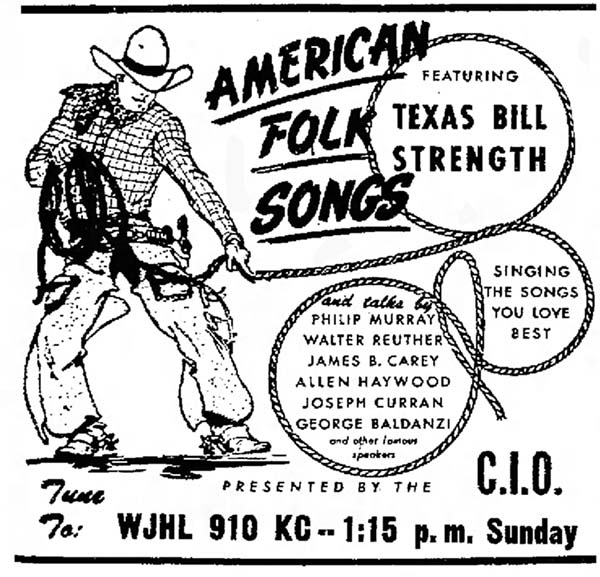
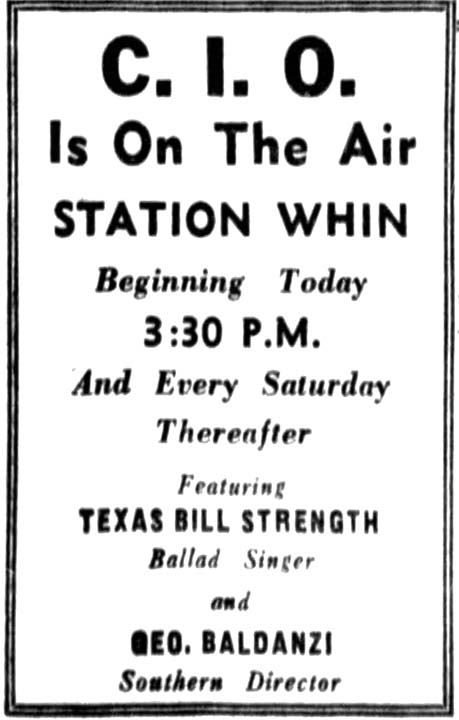
The shows were geared toward the Southern states of Virginia, Tennessee, Georgia, North and South Carolina, and Alabama, but were seen on radio logs in Texas as well. By 1951 they were heard on 126 stations.
Initially the target audience for these broadcasts were textile workers that the CIO sought to unionize. We see by the ad below that he was making personal appearances in 1950, sponsored by the Textile Workers Union of America, CIO.
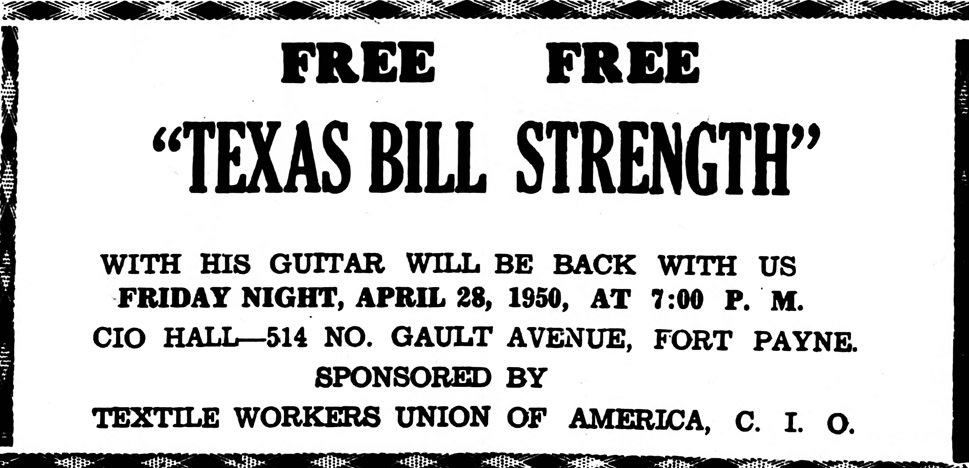
4-STAR RECORDS
In April 1950, TBS and his Saddlepals had a recording session for 4-Star Records in Houston.
Both songs were written by TBS. Billboard reported that the record (1465) was released on June 3, 1950.
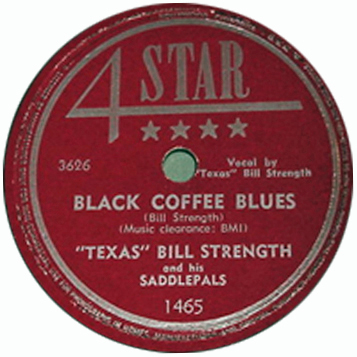
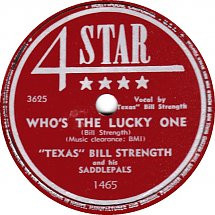
MEETING WITH SENATOR HUMPHREY
On April 18, 1950, Minnesota Senator Hubert Humphrey came to make a speech in Richmond, Virginia. The original plan was for Humphrey to debate Virginia Senator Byrd, but arrangements could not be made for Byrd’s appearance, so Humphrey made a speech on “Which Way, America?” The event was sponsored by the Virginia Commonwealth League (an anti-Byrd organization), and took place at someplace called “The Mosque.” (Richmond News Leader, April 18, 1950)
The caption on the photo below reads:
MUSIC BEFORE ORATORY – Enjoying a bit of rhythm before his speech here last night is Senator Hubert Humphrey (second from left), with David G. George and James P. Hart (right), Virginia Commonwealth League officials. Guitar player is “Texas Bill” Strength.”
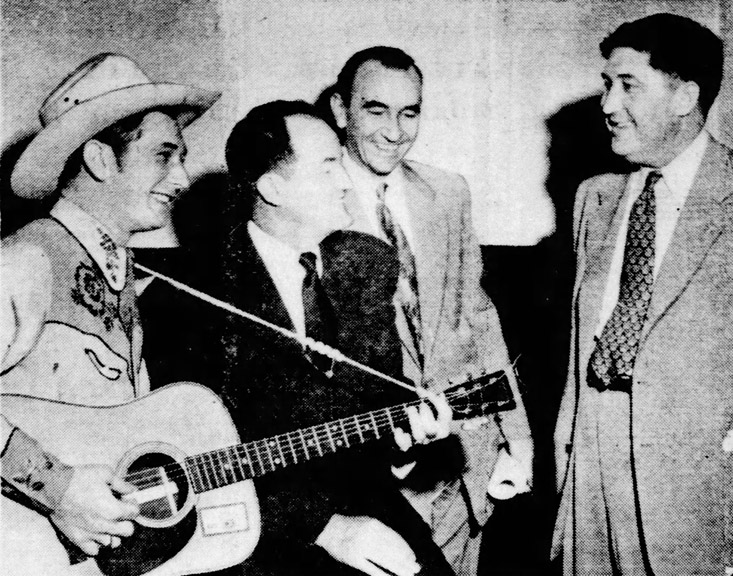
The photo below, heretofore undated, can now be dated April 18, 1950. Is the Senator playing Bill’s guitar? Photo courtesy Dale Strength
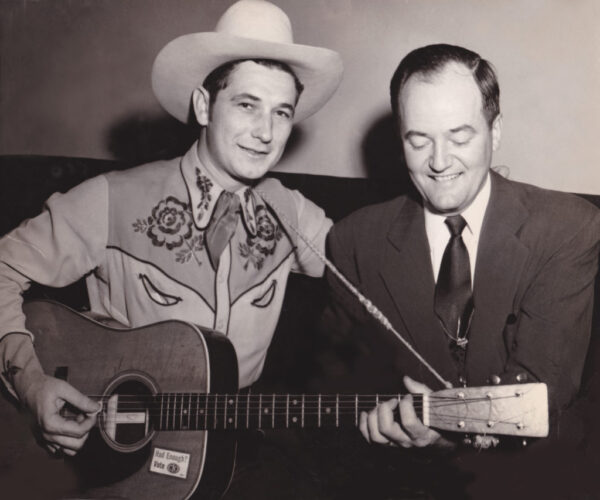
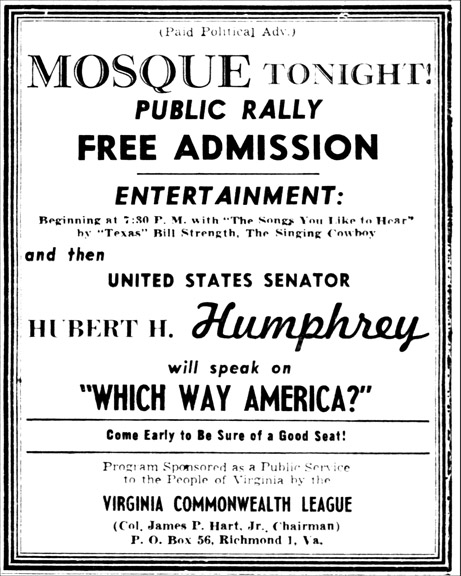
In the latter part of April, 1950, TBS was to accompany Representative George H. Christopher of Missouri on several appearances through Virginia Textile Workers Union Halls. The schedule was:
- April 21, Friday night, Fairy Road, near Danville
- April 22, Saturday afternoon, Clarksville
- April 22, Saturday night, Lynchburg Union Hall
- April 23, Sunday afternoon, Buena Vista
TBS was given two paragraphs about his background in the announcement in the Lynchburg (Virginia) News and Advance, April 18, 1950.
Unfortunately, TBS missed the April 22 event, where 250 textile workers showed up, because he was “called back to Georgia for organizational activity.” His replacement was Screechy Carwile, Lynchburg folksinger. (Lynchburg News and Advance, April 23, 1950)
May 1950
WE WILL OVERCOME
The CIO’s theme song was “We Will Overcome,” the same song used by the Civil Rights movement ten years later. Records show that TBS and His Saddle Pals recorded it at 4-Star Records (OP-102) in May 1950. The flip side was “Shall We Gather at the River.” No release date is known.
Another 4-Star release, this time with Number 45-1499, is shown to be recorded in July 1950, also with his Saddle Pals. The flip side was again “Shall We Gather at the River” and no release date is known.
In 1952, the record appears on a CIO label with the number OP-102. TBS is listed as the Producer. According to RP, it was only distributed to union members.
In 1952, 4-Star reissued its 102 as X-36. A recording date of January 1952 is given, but that may be the reissue date, as TBS was no longer recording for 4-Star in 1952.
These reissues are confusing, as we can see below that there is a record with the number OP-104 issued by 4-Star. TBS worked for the CIO from 1950 to 1952, and for 4-Star from May 1949 to about 1950.
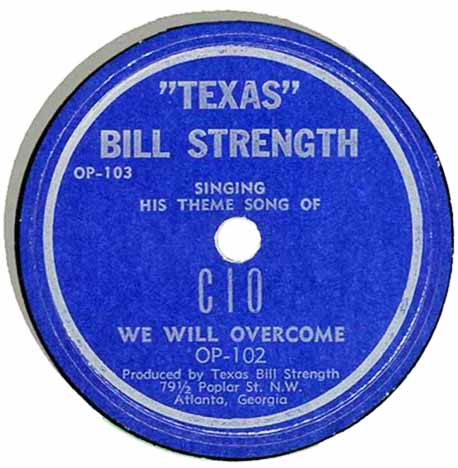
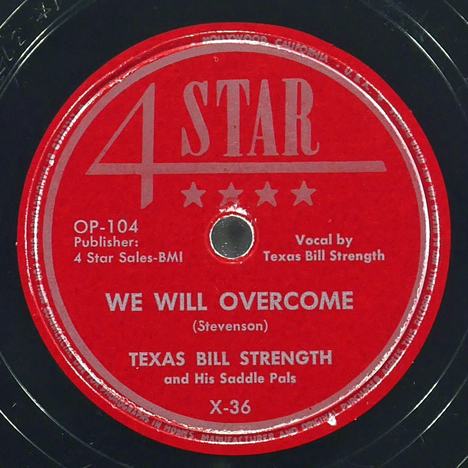
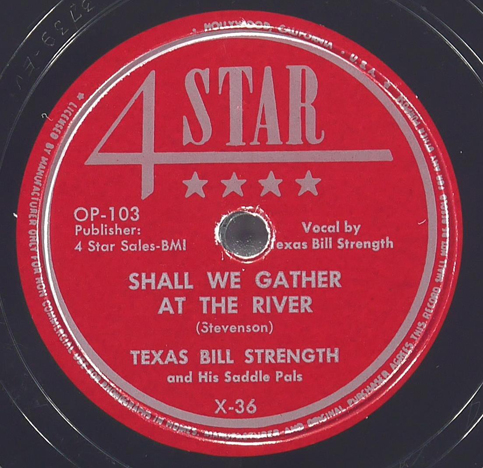
September 1950
4-STAR
In September 1950 TBS and His Saddlepals recorded four sides for 4-Star Records in Houston.
The first record was numbered 45-1532; no release date is known, and no Billboard review was found.
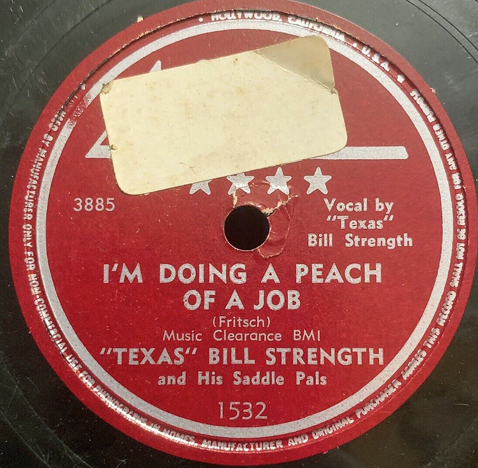
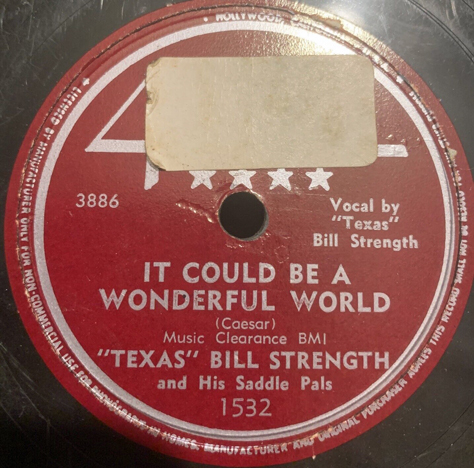
The second record was 45-1554 and was released in March 1951, as evidenced by an ad in Billboard placed by 4-Star Records on March 17, 1951. No review was found. It appears to be the last 4-Star release. The record below was pressed for disc jockeys and comes with a commercial!
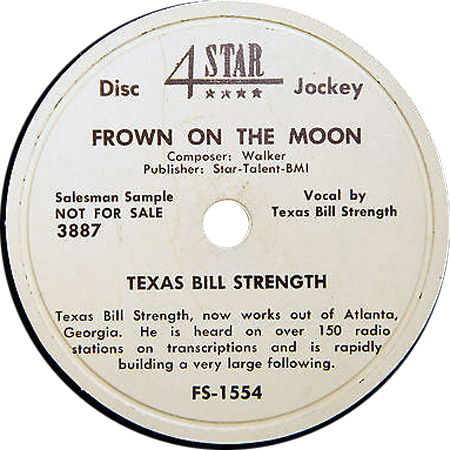
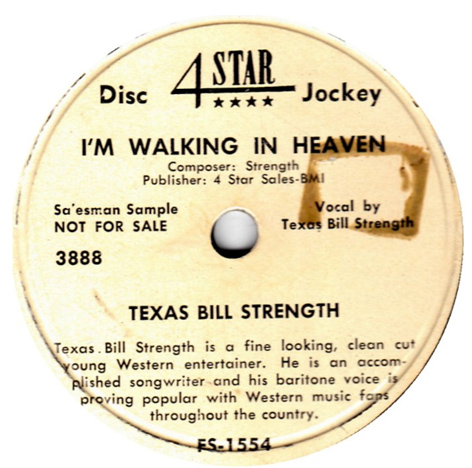
On September 22, 1950, TBS – billed as star of radio, stage and television – appeared at the Rebel Retreat in a program sponsored by the Bristol Optimist Club. Bristol, Virginia, and Bristol, Tennessee were across the state line from each other. Proceeds from the show were earmarked for the club’s general welfare fund. Bill was accompanied by a local band. (Bristol, Virginia Tennessean, Friday, September 22, 1950)
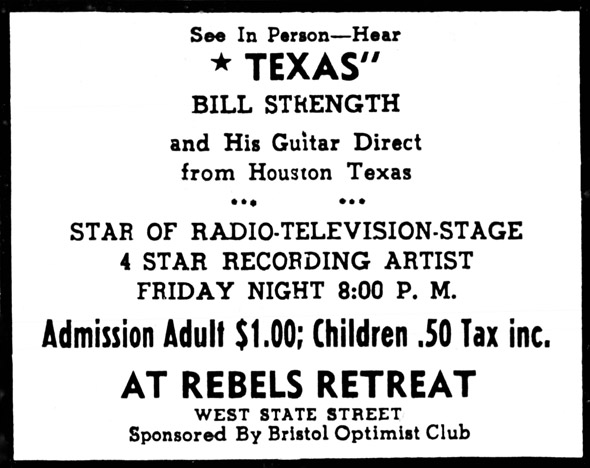
October 1950
- On October 1, 1950, TBS entertained 1300 boys at the Washington National Training School for Boys.
- On October 2 he was in Hickory, North Carolina, entertaining at the Sipes Orchard Home.
- He planned to give four or five shows in the area on October 3.
- From here he planned to go to Macon, Georgia to perform at the Macon Industrial Home.
Hickory, NC, Daily Record, October 2, 1950
On October 11, 1950, TBS performed three shows at the CIO Hall in Kingsport, Tennessee, for the benefit of Holliston Mills employees and their families. The shows were at 1, 3:30, and 7:30, and were sponsored by the CIO organizing committee. (Kingsport News, Tennessee, Wednesday, October 11, 1950)
On October 12, 1950, the CIO held a mass rally in the Hickory City (North Carolina) City Auditorium to acquaint the public with the CIO. In a pre-rally article, the Hickory Daily Record reported that:
Efforts are being made to arrange for the presence of TBS, movie and radio star [my emphasis], and the Hollywood Ramblers, composed of workers at a local furniture plant. “Emphasis at the present time is centered upon organizing the furniture industry in the Hickory-Lenoir-Newton-Conover area …” (October 7, 1950) Note that TBS had not and would not make a movie, despite his fondest dreams.
The next day, October 13, the Hickory Daily Record reported that:
Previous to the opening of the meeing and at intervals during the sessions, music was furnished by “Texas” Bill Strength of Houston, Tex., widely known guitarist and singer of hillbilly songs; and Oscar Turner and “Red” Eckhard, guitarist singer and mandolinist-singer, respectively, Hickory furniture plant workers.
November 1950
In his column “Lowdown on Hoedown,” Verlin Mays wrote that TBS was
enjoying a brief vacation after his recent tour through Bristol and surrounding towns in Southwest Virginia and East Tennessee. According to a letter I received from Bill, he’ll really start to work in earnest in a few more days. I’d like to wish him a lot of luck because he certainly is a fine boy and a wonderful entertainer.
Bristol Virginia Tennessean, November 10, 1950
December 1950
TBS (4-Star), who has been working labor meetings for the CIO during the past 14 months, was featured singer at the CIO’s national convention in Chicago at the Hotel Stevens two weeks ago. The labor org intends to cut a six-disk album shortly of labor songs by Strength. (Billboard, December 15, 1950)
TBS, “the well known Southern radio and recording star,” was scheduled to make a personal appearance at a “Let’s Get Acquainted” Square Dance sponsored by Local 273, United Furniture Workers of America, CIO (Williams Furniture) on December 4, 1950, at Dave’s Place in Sumter, South Carolina. (Sumter Daily Item, Saturday, December 2, 1950)
TBS with Hank and Audrey Williams in Shreveport, 1950.
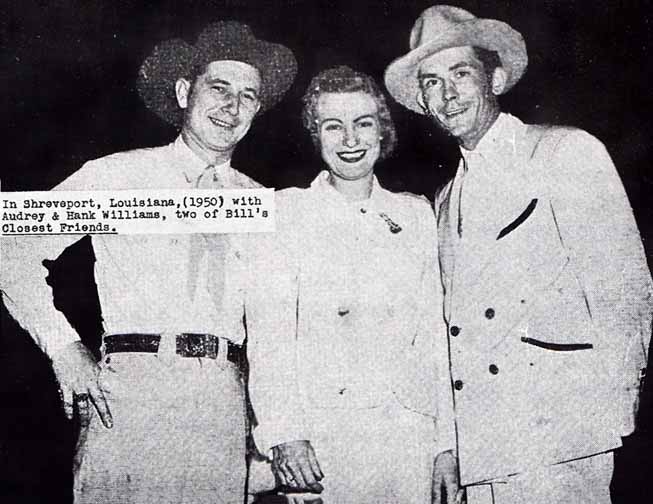
1951
GRAND OLE OPRY
Somewhere it says that TBS had been the guest of Ernest Tubb on the Grand Ole Opry five times by 1951. Dates for Bill’s appearances on the Opry are very difficult to track down. Another “article” says that he appeared on September 23, 1950, but that article seems to have disappeared. Other possible dates are:
- 1952 – In his “Down Memory Lane” column, he wrote that he was on the same segment as Hank Williams on his first appearance on the Grand Ole Opry in 1952 (Upper Midwest Country & Western News – Scene, September 1973)
- March 21, 1953, guest of Webb Pierce
- July 12, 1953
- 4
- November 21, 1953 (but that was the Disc Jockey Convention)
- January 29, 1955, guest of Faron Young (or was it the same date, 1956?)
- Spring 1955, guest of Carl Smith
- August 6, 1955
- April 22, 1961
Mind, one needs to be asked by a member to be a guest on the show, and TBS was never a member of the Opry. He was a frequent member of the Grand Ole Opry roadshows, but the number of times he actually appeared at the Ryman Auditorium in Nashville is unknown.
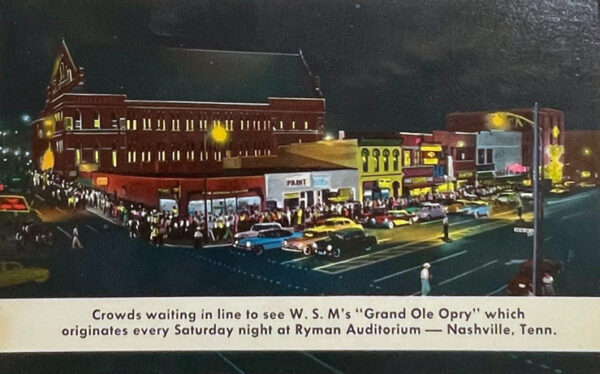
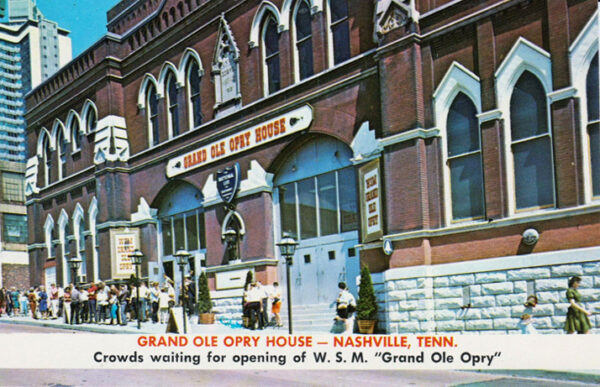
The 1951 Atlanta directory listed TBS’s occupation as “vocalist CIO,” living at 124 Jewel.
January 1951
TBS entertained at a two-day CIO convention in Tampa on January 13-14, 1951. (The Tampa Tribune, January 12, 1951)
February 1951
On February 1, 1951, TBS was in Birmingham, Alabama, for a series of CIO meetings. He was pictured in the Birmingham Post-Herald on February 2 visiting the “Crippled Children’s Clinic,” “which is his custom in each city he visits.”
TBS entertained at a meeting of the United Steelworkers of America from Utah and Nevada, which took place in Midvale, Utah, on February 4, 1951. (The Park Record, Park City Utah, February 1, 1951)
April 1951
Robert Wayne Strength, TBS and Dorothy’s second child, was born in Atlanta on April 13, 1951.
On that very day, Ernest Tubb wrote a generous introduction of TBS to Dave Kapp of Decca Records, inviting Kapp to listen to Bill’s music. At this point in his life, Bill was probably indeed still clean cut and conscientious. His wife Dorothy said that his problems with alcohol didn’t start until he met the boys in Memphis in about 1954.
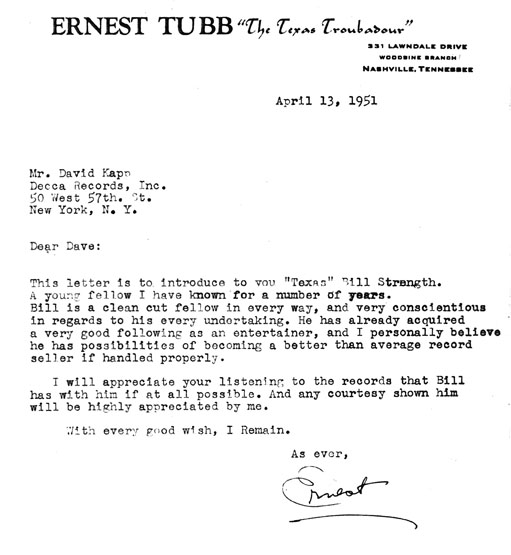
In 1951 TBS made several appearances over WAGA-TV in Atlanta while still working for the CIO.
October 1951
The photos below were taken at a conference of the United Steelworkers of America, District 35, Local 309, in Alcoa, Tennessee, on October 6, 1951. The man in the second photo is W.H. Crawford. At the time, Crawford was the Director of the United Steelworkers of America.
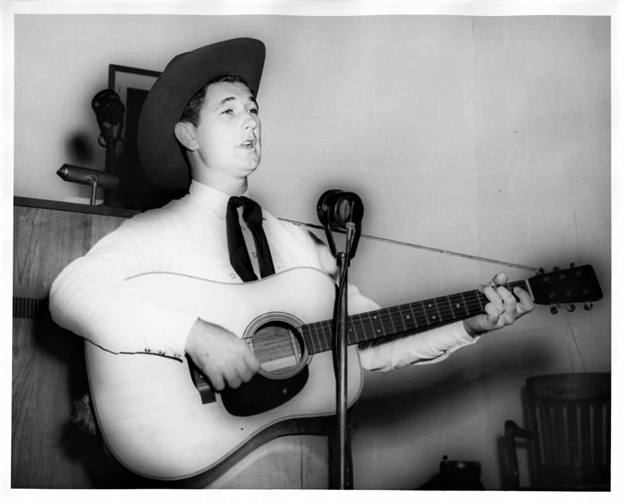
Photos Courtesy Georgia State University Library
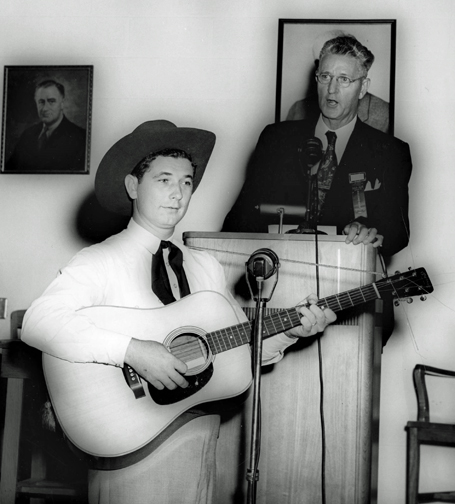
November 1951
CORAL RECORDS
In November 1951, TBS signed a three-year contract with Coral Records, a subsidiary of Decca. His friend Ernest Tubb was instrumental in securing the deal, which was beneficial to Tubb as well, since it meant extra work for some of Tubb’s Texas Troubadours. Plus, TBS was under contract for a time to Ernest Tubb Music for his publishing. (Ronnie Pugh)
Billboard explained that Owen Bradley was hired to head up the recording operation of Coral Records, and nine new country artists were added to the roster, including TBS “of Atlanta.” (February 9, 1952)
On November 26, 1951, he had his first Coral session, cutting four sides at the Tulane Hotel in Nashville:
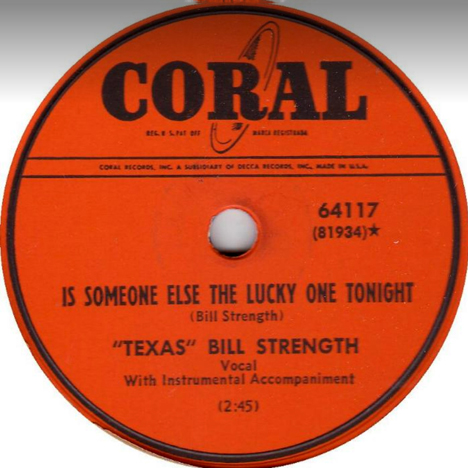
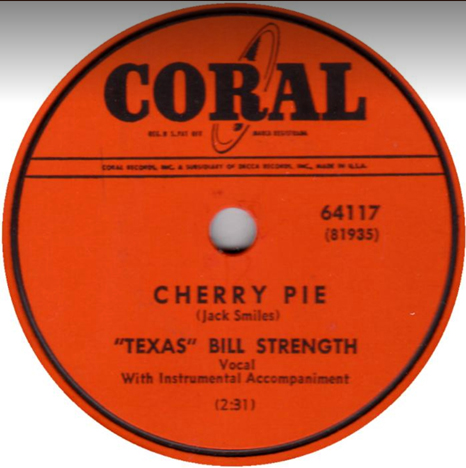
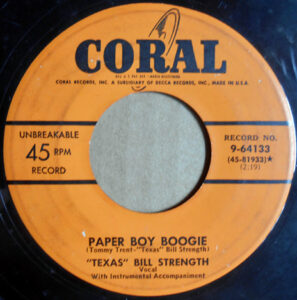
Paper Boy Boogie” was originally written and released by country singer Tommy Trent on Checker Records. TBS added his own flair and covered it shortly afterwards.
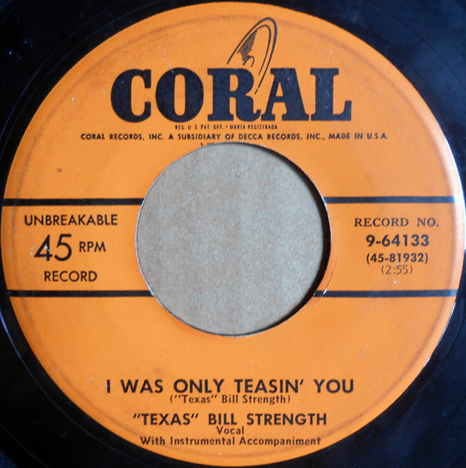
Coral 64117 was issued as a 78 rpm record. No release date or Billboard review were found.
- “Is Someone Else the Lucky One Tonight,” written by TBS
- “Cherry Pie”
Coral 64133 was issued in June 1952 and Billboard reviewed it on June 14, 1952:
- “Paper Boy Boogie:” “Material in this one is very strong with a good boogie beat. Fine instrumentation includes a standout honky tonk piano. Vocal by Bill Strength adds to the attractiveness of side. Should pull coin.” (Ronnie Pugh says Chet Atkins played guitar on this record.)
- “I Was Only Teasing You:” “Tune is a switch on the normal weeper. Texas Bill warbles it in pleasant style with a fine assist from the sidemen.”
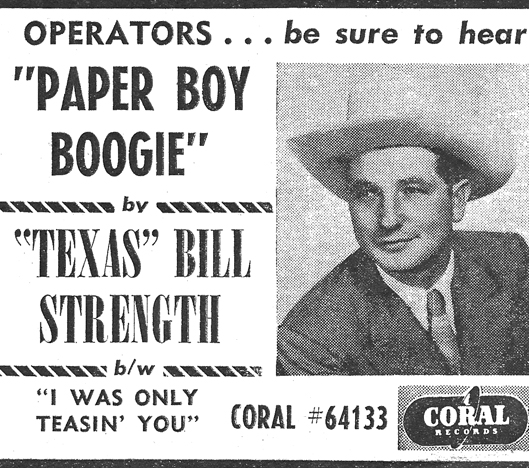
At some point in 1951, TBS entertained a North Carolina textile organizing meeting. Now, this photo may just be 2/3 of Bill from the back, but the message it imparts lies in the smiles and laughter on the faces of the men and women in his audience.
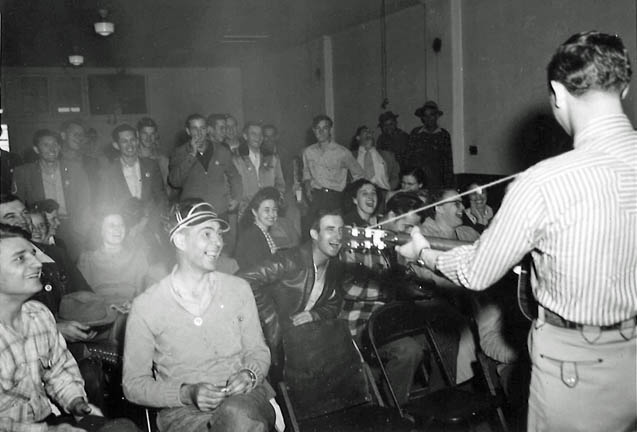
1952
February 1952
TBS, new Coral addition, is now working regularly at WAIM, Anderson, SC, and plans to book more talent into his region. He is contemplating using Ernest Tubb soon. (Billboard, February 23, 1952)
April 1952
TBS (Coral) is still working out of the Atlanta office of the CIO, doing songs at labor gatherings. (Billboard, April 5, 1952)
WEAS, DECATUR
On April 6, 1952, TBS moved his base from WGST in Atlanta to WEAS in Decatur, just 5 miles northeast of downtown Atlanta. No longer just on Sundays, a June 1954 article mentioned that his show was from 11:00am to 12:45pm daily. Still working for the CIO, his target audience consisted of the employees of Lockheed. He had a manager, John V. Riffe of Atlanta. (Ronnie Pugh)
This half-hour show gave out special prizes and launched the “Texas Bill Talent Hunt.” “Anyone who can sing, whistle or play ‘Chopsticks’ on a musical instrument and wants to appear with Bill on the radio should contact the CIO office.” (Ronnie Pugh)
Bill would spend over two years at WEAS, and became a fixture in the Atlanta area. He was known as “The Singing Disc Jockey.”
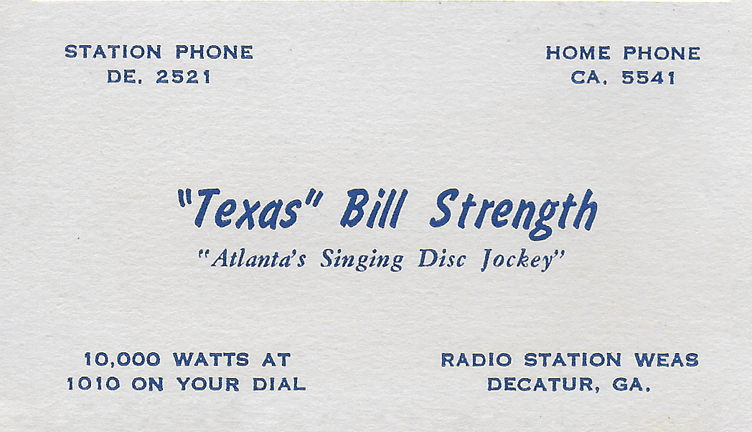
- He brought top country music acts into the area for the Dixie Barn Dance, held at East Point’s Civic Auditorium.
- He appeared on WLWA-TV with Ray McKay and the Swingbillies.
- He recruited acts to appear at “his own” Silver Slipper Club, where he would perform on weekends.
THE SILVER SLIPPER
After much frustration and asking questions and writing letters, we still do not know where TBS’s elusive Silver Slipper night club was located. References in the newspaper go back to 1937, when it was reported that Police found a stolen taxi at the Silver Slipper roadhouse on the New Macon Highway (which is now the Old Macon Highway). In 1938, owner Paul Johnson was indicted by the Clayton County Grand Jury on three counts of having slot machines at the Silver Slipper roadhouse. In 1941, County Commissioners revoked all dance hall licenses in Clayton County. The Silver Slipper was referred to as a “Jook.” The location was described as just beyond the Fulton County line on McDonough Highway.
By 1949, the Silver Slipper had changed hands and was now owned by J.P. Copeland. We know this because he was in trouble. He also had a tourist camp, and he was charged with not keeping track of his guests’ cars. Think of one of those noir movies where the young couple are running from the law and/or their parents for one reason or another. We learn here that both the Silver Slipper and the tourist camp are on Highway 42.
On February 20, 1950, the Silver Slipper was advertised for sale or lease. The property included the night club and courts, and apparently was described as being on the Airline Highway.
The first ad shows up in 1950:
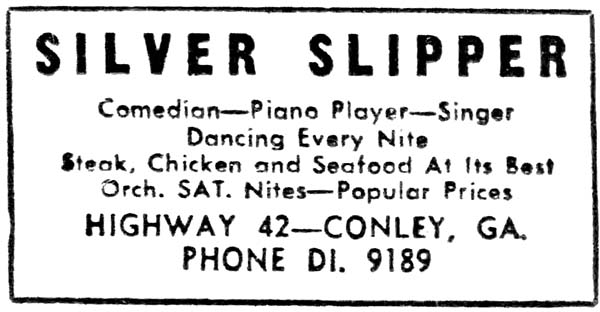
On February 28, 1953, one could dine and dance to Groover’s Orchestra.
On June 5, 1953, the Silver Slipper Dining Room was listed for rent or sale. The ad said that it seated 200. It’s possible that this may have been when TBS became an owner/partner.
The next mention is an ad in February 1954.
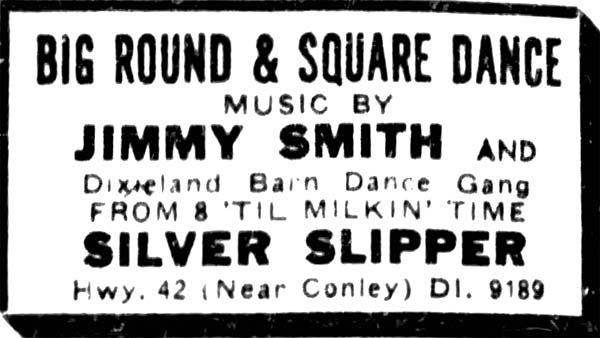
It was probably during 1954 that TBS recorded “Y’all Come” on the radio, which can be heard here. As you can hear, he throws in a “to the Silver Slipper Friday nights.”
Most mentions of the place in Billboard occur in 1954, and are listed below.
An issue of the Houston Star from the Summer of 1954 provides the names and instruments of the Melody Ranch Boys while promoting TBS’s club, the Silver Slipper:
Every Friday and Saturday night, folks in and around Atlanta can now dance to the music of TEXAS BILL STRENGTH, and the MELODY RANCH BOYS, at the fabulous SILVER SLIPPER SUPPER CLUB, on Hiway 42, eight miles from downtown Atlanta. The MELODY RANCH BOYS feature Buddy Pattilo, fiddle; Jimmy Estes, electric bass; Lamar Hawkins, electric guitar; and our star, Bill. They are also heard daily at 7:15pm over WEAS.
Even though he left Decatur for Memphis in September 1954, the Silver Slipper continues to be mentioned until the end of October 1954.
In January 1955 it was further described as being on Moreland Ave., which is the same as Highway 42.
One last ad for the Silver Slipper appeared in 1957:
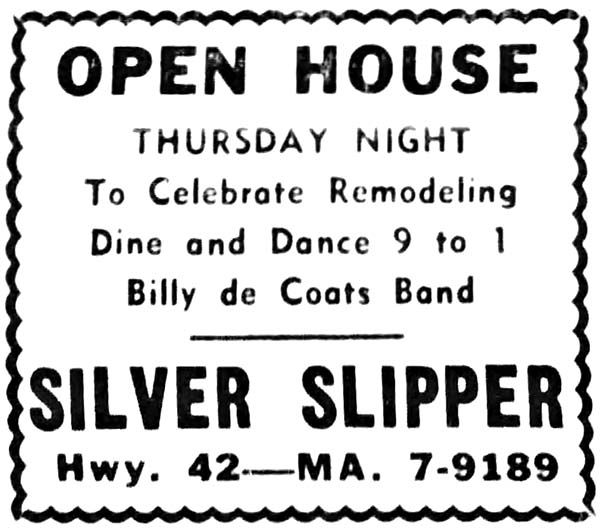
On October 21, 1959, owner Jasper T. Copeland died of a stroke. He had lived on Highway 42 for 14 years. The Silver Slipper had been leased to Amvets.
The area is mostly industrial now, but there is something telling. There is a road that loops off of and behind Moreland Ave. called Cottage Lane; ironic given the miles of trucks and factories it abuts. But one guess is that the Silver Slipper or at least those tourist cabins used to sit inside that area. So far, the answer is elusive.
April 1952
Sandra Pearl Strength, TBS and Dorothy’s third and last child, was born on April 13, 1952, most likely in Atlanta. Her arrival was announced in the July 26, 1952, issue of Billboard.
June 1952
CORAL RECORDS
On June 27, 1952, TBS had his second recording session for Coral at the Tulane Hotel in Nashville:
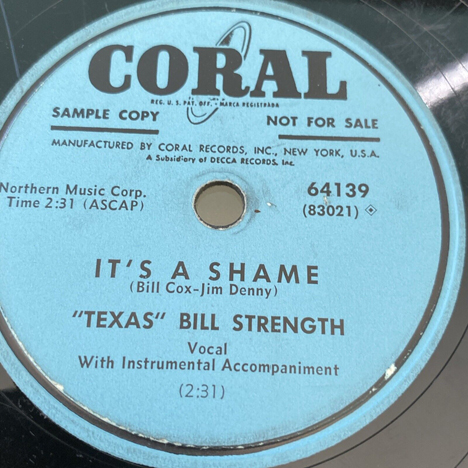
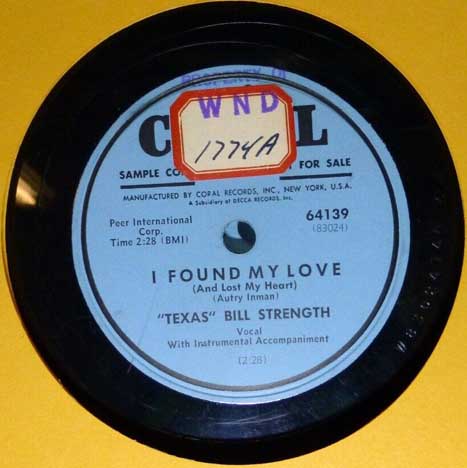
The record was released in September 1952 and reviewed by Billboard on September 27, 1952:
- “I Found My Love” – The chanter has a fine country tune here and he gives it a sympathetic reading. Tho Strength’s piping is not very powerful, he projects with a good deal of warmth.”
- b/w “It’s a Shame” – “Routine rural weeper is read with the proper pleading quality by Texas Bill. Might do okay in the more rustic areas.”
July 1952
Strength’s e.t. radio show is now heard on 51 Southern stations. He is still touring for the CIO. (Billboard, July 26, 1952)
CORAL RECORDS
On July 28, 1952, TBS returned to Coral Records for his third recording session:
- “Rain or Shine”
- “Heart Don’t Complain”
Coral 64152 was released in March 1953 and reviewed by Billboard on April 4, 1953:
- TBS is on the charts with Coral release “Rain or Shine” (“Bouncy ditty is sung nicely by Strength with his strong voice. Strong band gives good support.”)
- b/w “Heart, Don’t Complain” (“Melancholy oatune is warbled with feeling by Strength. He’s trying to tell his heart that he tried his best.”)
TROUBLE IN HAZELHURST
Being an itinerant folk singer with the CIO was not without its hazards. Organizing large companies was a hot-button issue in the 1950s, and you might just get run out of town.
Take for example the case of the Cook Lumber Company, where CIO organizer John Scott was “mauled” by a man at the gate of the company on July 31, 1952, for handing out union leaflets to workers. The next day, July 1, a man claimed he was beaten by union organizers. July 1 was also the day that John Ramsey, the director of community relations for the CIO, and Texas Bill arrived in town from Atlanta. Bill was known as “the CIO Singer of Songs,” said the report. Ramsey said that he, Scott, and Strength were beaten by seven men at the gate of the plant.
The CIO organizers had planned a mass meeting on July 2, but they called it off at the request of the Sheriff, who could not guarantee their safety. The Sheriff said he feared violence unless the organizers left town. As the six union men started to leave their hotel, a crowd of about 50 men gathered around, and the Sheriff told the mob that the CIO men were leaving. The Sheriff escorted the union men to a nearby town, followed by about a dozen cars.
Ramsey vowed to return to Hazelhurst with lawyers and warrants in two or three weeks to arrest their assailants. He said that they were asked to come into Hazlehurst, and “the trouble was started by a small gang of thugs used by certain politicians.” (The Macon Telegraph, Monday, August 4, 1952)
August 1952
TBS was the special guest on KWKH’s Louisiana Hayride, in Shreveport, on August 2, 1952.
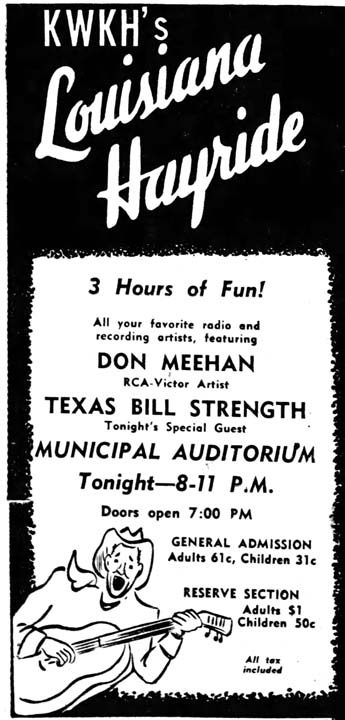
Fall 1952
THE HOUSTON STAR
Another indication of TBS’s popularity was his Fan Club, based in Columbia, Tennessee. The club was run by Willie Bea Gray and Freda Jones, who called him the Houston Star.
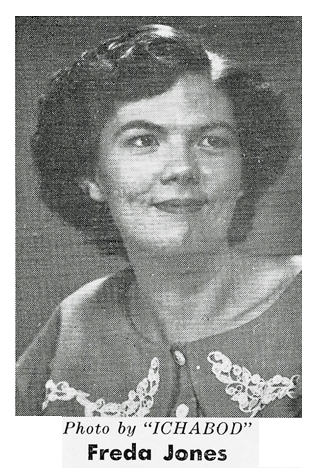
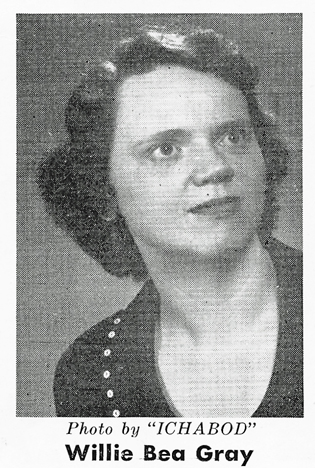
For a dollar a year, members received an autographed photo, membership card, a newsletter every six weeks, and the quarterly Houston Star publication, described as slick, fact-filled, and one of the best of its kind. The first issue came out in the Fall of 1952. By the spring of 1954, membership reached 40,000 in 20 states, and by that fall it claimed coverage in all 48 states. The club’s motto was “Let’s Boost Bill With All Our Strength.” (Ronnie Pugh)
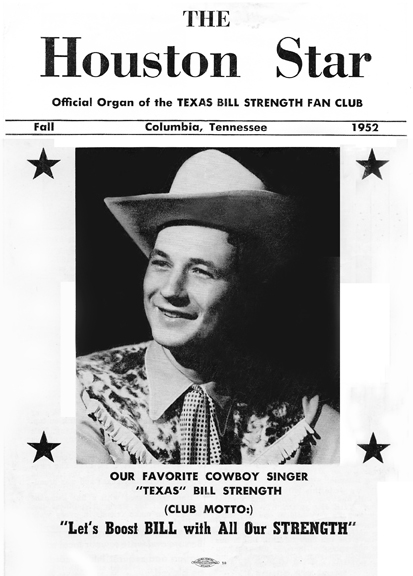
They open with this letter to Texas Bill’s fans:
Dear Friends:
As we write this letter we are hoping it will find you as happy and thrilled about “THE HOUSTON STAR” as we. You see, it’s very seldom one can work with a fine person as our own Bill Strength. And we do feel it a great honor to have the fan club for Bill. Bill is our one and only goal, and we do want you friends to put your full Strength behind our Bill – making him one of the tops in this folk music world! He has put his full support behind the club, and it is his will for it to be a success. With your help it will be a success. It is as much your club as it is ours, so be sure to send your news for the journal and write and tell us what you think of this first issue. We hope you will help us to obtain new members. And please do request and buy Bill’s records. You’ll like them we know! Remember – Let’s Boost Bill With All Our Strength. In the meantime don’t forget we are —
Yours for Bill,
Freda and Willie Bea
Here was Bill’s response, also in that first edition in Fall 1952:
Dear Club Members:
I don’t know how to go about thanking you for taking an active part in my new fan club. I’m really excited about it, and of course, grateful to Freda and Willie Bea for being so progressive in getting it started.
We want you to feel that this is your club, and want you to mail in suggestions on how we can improve it. From time to time, we’ll print the words to songs, poems, etc. Be sure and let us know who your favorite country singer is. Freda and I have discussed having a contest later on. You’ll be hearing more about it in the near future.
In future issues of the HOUSTON STAR, I’ll be letting you know where I’ve been on my trips for the CIO, and when I’ll be coming through your home town.
Until next time, lots of luck to each of you, and thanks for joining the club.
Texas Bill Strength
Tragedy struck in April 1954, when the home of President Freda Jones was destroyed by fire, taking all of the records of the club with it. Miss Jones asked that members contact her by writing to the club at 104 East 14th Street, Columbia, Tennessee. (Huntsville Times, April 8, 1954)
Ronnie Pugh stated that the club operated between 1952 and 1955, Bill’s peak years in the South. Indeed, we have copies of the Houston Star dated:
- Fall 1952
- Spring and Winter 1953
- Spring and Summer 1954
- Spring, 1955
However, there was evidence that it lasted at least until at least 1957. On September 30 of that year, Billboard reported that Mary Moore, 112-A Peak Tops (U.S.N.S.), Green Cove Springs, Florida, is the new president of the TBS Fans’ Club, succeeding Dixie Ann Brown, who has been forced to resign due to illness.
October 1952
TBS may guest at the national CIO convention in Los Angeles in mid-November. (Billboard, October 25, 1952)
1953
The 1953 Atlanta directory listed TBS’s occupation as “field rep CIO,” living at 124 Jewel East Point.
SOUTH CAROLINA
February 1953
TBS (Coral) is renting his home in Atlanta to move permanently to Columbia, SC, where he’ll do his radio shows for the CIO. (Billboard, February 7, 1953)
The above was the last mention found of the CIO. It appears that, for whatever reason, TBS chose to leave the CIO (or the CIO chose to part with him) and he returned to his job and home in Atlanta, on WEAS. Ronnie Pugh’s biography doesn’t mention this move to Columbia, so there’s no evidence other than the Billboard items that he actually moved his family out there.
March 1953
NASHVILLE
From the Houston Star, Spring 1953:
TBS guested on Webb Pierce’s program at the Grand Ole Opry on March 21, 1953.
Two of his fans took the bus to see him, and wrote their recollections for the Houston Star, Spring 1953:
[He was]dressed in a lovely green cowboy suit. The yoke o the shirt was in white, greeen fringe. On the pants were designs of white horseshoes at the pockets. To this Bill wore a green scarf, white hat, and green and whitte cowboy boots. All of you would have been proud hof nice he looked that Saturday night.
He also went to the Ernest Tubb Record Shop, where he sang his latest release, “Rain or Shine.”
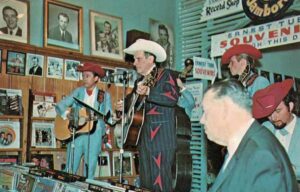
He also made an appearance on Smiling Eddie Hill’s “Opry Echoes” at radio station WSM.
(BACK TO) ATLANTA
April 1953
Bill was on WEAS in April 1953, although for only half an hour in the early morning. On Sunday, April 26, he performed two shows with Hank Thompson and his Brazos Valley Boys, Ron McKay and the Swing Billies, Dan Ross, and others at a show at the East Point Auditorium in East Point, Georgia. In his Fan Club newsletter, the Houston Star, he reported that Hank came over to the Strength’s house for dinner.
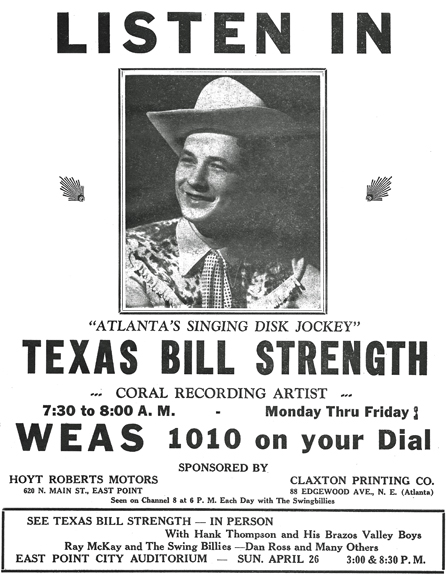
May 1953
TBS writes from Atlanta that he’s now [back] with that city’s Radio Station WEAS. (Billboard, May 2, 1953) He had worked at WEAS since April 6, 1952.
He was also appearing on TV with Ray McKay and the Swingbillies at WLWA-TV (Mondays at 5:30 pm, Channel 8.) Plus he had a one-our broadcast on Saturday mornings called the “Young American Club,” which gave young boys and girls a chance to get on radio and win prizes. “I’m really thrilled about this show,” he wrote in the Houston Star. “It looks like it will eventually grow into something big for the boys and girls in Atlanta.”
Bill rode a beautiful white stallion in a huge parade down Peachtree Street in Atlanta on May 7, 1953, in honor of Korean war veteran and former P.O.W. Pfc.William G. Moreland of Atlanta, reported the Spring 1953 issue of the Houston Star.
On May 10, 1953, TBS appeared with Mrs. Hank Williams at the East Point Auditorium in Atlanta. Also on the bill were Radio Dot and Smoky, and the Swingbillies.
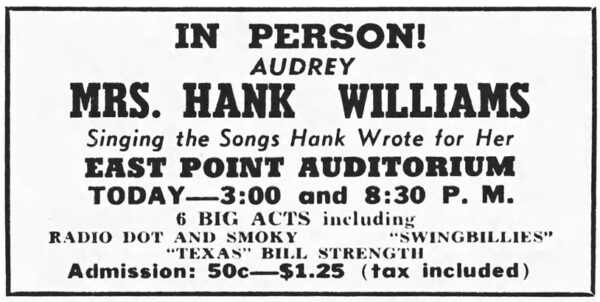
In the Spring 1953 issue of his fan club’s Houston Star newsletter, he said that his wife “Dot and I intend to go to Hollywood for our summer vacation and visit Tex Ritter.”
Other news was that TBS’s new Song Book #2 was now available for 50 cents, sent to TBS Publications at a PO Box in Atlanta.
June 1953
TBS, Coral recording star, has started a talent quest show over radio Station WEAS, Atlanta, “Young American Club Broadcast,” from 9 to 10 am each Saturday. Youngsters perform either hillbilly, pop or jazz. (Billboard, June 6, 1953)
The Winter 1953 issue of the Houston Star reported that the Strengths did indeed take that summer vacation to Hollywood. TBS and promoter William McFarland drove to the West Coast, and Dorothy followed by plane, arriving seven days later than the men did. The children stayed home. Dorothy visited an aunt and uncle, who had never met Bill before. They took the Sunset Limited back together, via Pasadena, Tucson, Yuma, and El Paso.
The Winter 1953 Houston Star also mentioned several other appearances, some dated, mostly not:
- He was a featured star on the “Mid-Western Hayride” program, over station WLW in Cincinnati. That was both a radio and TV show, so there’s no way to determine which he was on.
- He was a guest of Jimmy Skinner over WNOP, Newport, Kentucky.
- He played to a full house for Ted Kirby in Ft. Payne, Alabama.
- He played the National Guard Armory in Birmingham.
July 1953
On July 12, 1953, Red O’Donnell, in his “Top o’ the Mornin’” column in the Nashville Tennessean, reported that TBS was in town to appear on the Grand Ole Opry. The next month, August 1953, O’Donnell noted TBS’s birthday in his column.
September 1953
TBS is working in Atlanta’s Coral distributor’s office with John Thompson (formerly Cincinnati) in charge. (Billboard, September 12, 1953)
October 1953
TBS and Leon Beaver set for new Coral session immediately under direction of Johnny Thompson, who also handles diskery’s Atlanta office. (Billboard, October 3, 1953)
TRAILWAYS STATION
On October 15, 1953, Atlanta’s new Trailways Bus Station opened with much ballyhoo, and TBS was prominently included in the festivities. Below is the full page and two close-ups of the entertainment sections, from the Atlanta Constitution.
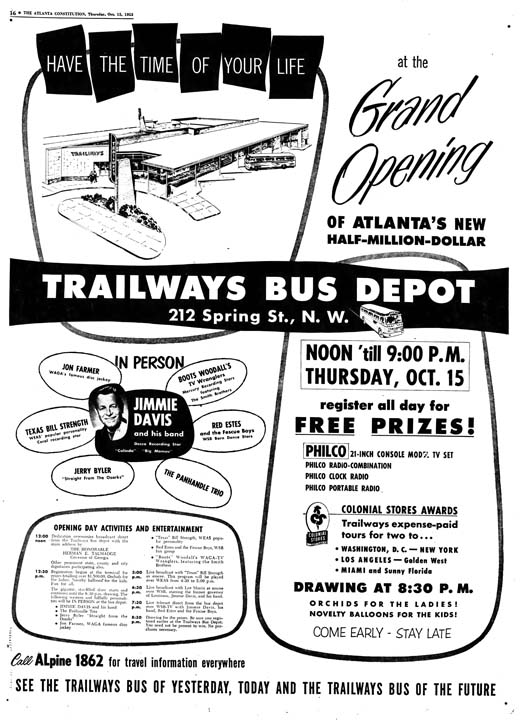
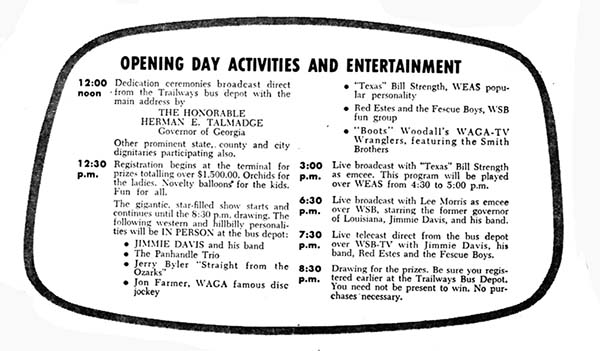
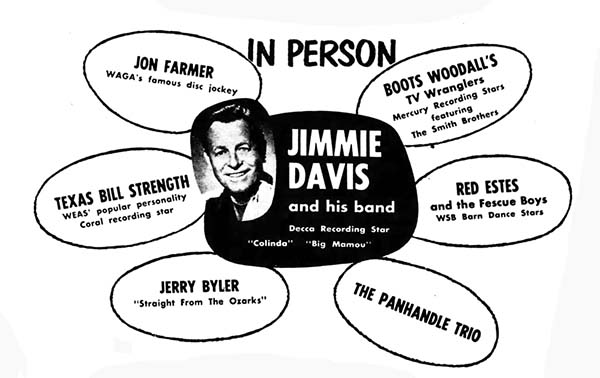
Billboard reported that ex-Governor Jimmy Davis was the guest of Georgia Governor Herman Talmadge for the occasion, and that festivities were headed by:
- Boots Woodall
- Smith Brothers
- Paul Rice
- Pat Patterson
- Cotton Carrier
- TBS
The Houston Star reported that Bill and Curtis Gordon promoted a show in East Point, Georgia on October 25, 1953, which starred Faron Young, Little Rita Faye, Smily Wilson, and Kitty Carson. No evidence of this show is found in the Atlanta newspapers online, and in fact, Faron Young had just gone into the Army and was highly promoted for a show on September 11 for U.S. troops.
However, on November 14, 1953, Billboard reported that TBS promoted an all-star country jamboree in Atlanta recently, with:
- Little Rita Fay
- Curtis Gordon
- Faron Young
- Smiley Wilson
- Kenny Lee
- Kitty Carson
- David Bucie and his boys headlining the bill
RHYTHM RANCH
From the end of October to the end of November 1953, TBS had some dates at the Rhythm Ranch, 19 Baker Street NW, in Atlanta. He shared the stage with the Las Vegas Seven, but also with Piano Red, a/k/a Dr. Feelgood?!
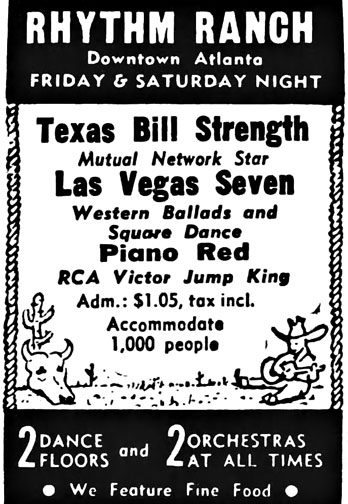
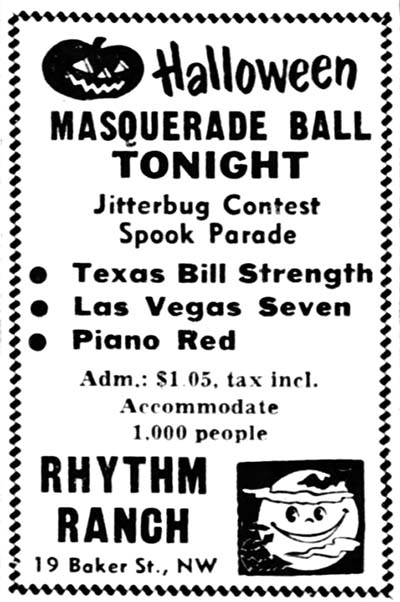
November 1953
NASHVILLE
November 20 – 21, 1953 were the dates of the Second Annual Hillbilly Disc Jockey Convention, held in Nashville. These events became more and more corrupt and riotous, until the convention of 1959 broke open the whole corrupt system of payola. An expose in the Miami Herald shouting “Booze, Broads, and Bribes” put many DJs out of work, including Alan Freed, virtually the inventor of Rock ‘n’ Roll. Dick Clark survived only by divesting of his many other interests in movies, song publishing, and other subsidiaries.
The Houston Starr also reported that while in Nashville, TBS also guested on the Ernest Tubb Jamboree and made a guest appearance on the Grand Ole Opry.
CORAL RECORDS
On November 21, 1953, TBS recorded four sides for Coral at the Tulane Hotel in Nashville.
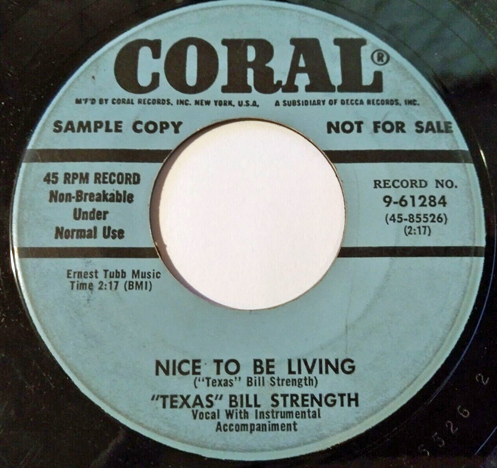
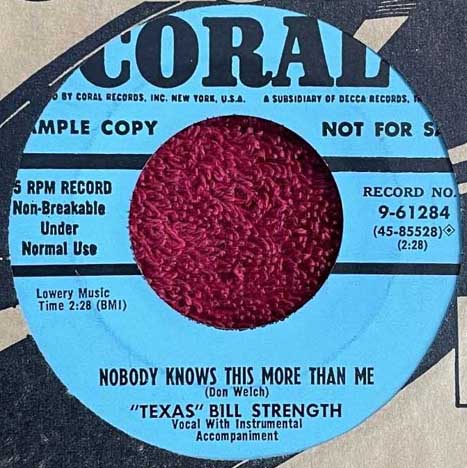
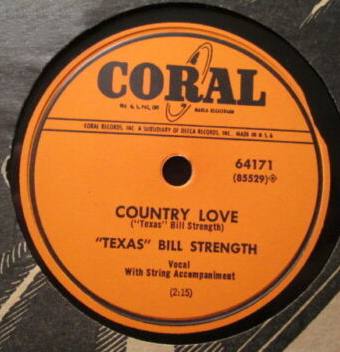
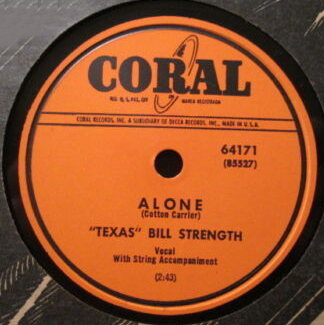
Coral 64171 was released in January 1954 and was reviewed in Billboard on February 6, 1954:
- “Country Love” – “Here’s a real cute country item, combining novelty appeal with solid rural sentiment. The ditty is Ernest Tubb’s, and TBS gives it a solid vocal.”
- b/w “Alone” – “A rural ditty full of sadness and pitched in a minor key. TBS does the vocal with heart.”
Coral No. 61284 was release in November 1954 and Billboard reviewed it on November 13, 1954 (a year after the sides had been cut):
- “Nice to be Living,” – A jaunty-paced vocal on a happy little ditty
- b/w “Nobody Knows This More Than Me” – A plaintive weeper about a man who couldn’t buy love, sung with sincerity and feeling.
This acetate appears on YouTube, and appears to be a demo, before the final version of “Nice to be Living” was recorded.
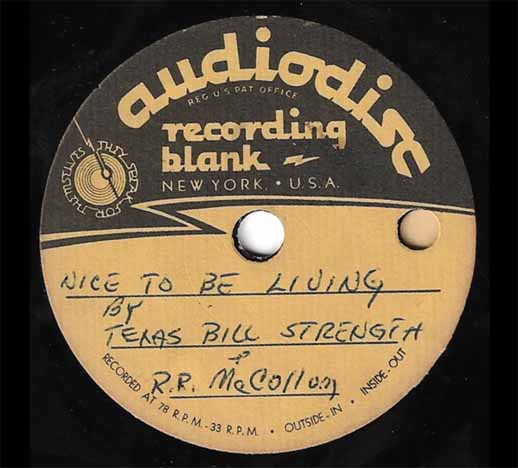
On November 22, 1953, TBS promoted a “Hillbilly Jamboree” at Atlanta’s Municipal Auditorium. Homer and Jethro headlined the bill and there was a capacity crowd. Also featured were:
- Mac Wiseman
- Bonnie Lou
- Jimmy Skinner
- Swingbillies
- Las Vegas Seven
- Tom Gibson
- Warren Roberts
(Billboard, November 21 and December 5, 1953)
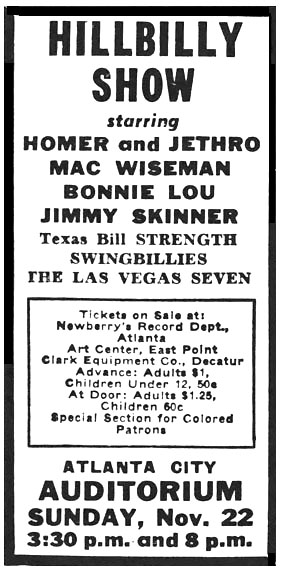
Another cool ad for a gig at the Rhythm Ranch. These appearances came with some regularity, at least through mid-December 1953, with Bill Drake listed at the top of the bill.
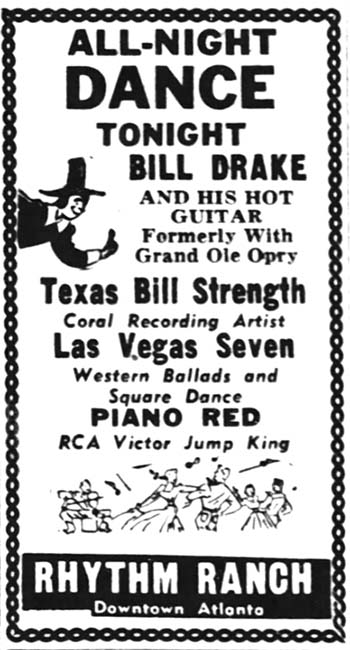
December 1953
December 5, 1953, ad in Billboard:
TEXAS BILL STRENGTH
CORAL
Radio Affiliation, Live Show: WEAS, Atlanta; As DJ: Same
Instrument Played: Guitar
Personal Manager: Bill Keller, 217 West Ponce De Leon Ave., Decatur, Georgia
Booking Office: Stars, Inc., Candler Bldg., Atlanta
Favorite Record, Own: “It’s a Shame;” Other: “May the Good Lord Bless and Keep You”
No. Personal Appearances per Month: 12
Speaking of Coral, it appears that TBS had four songs that he had pitched to his record company but they didn’t want him to record them, so he made an acetate of them, hoping someone else would record them. The songs are:
- “My Ray of Sunshine”
- “I’m So Happy I Could Cry” (the opposite of “I’m so Lonesome I Could Cry”)
- “If I Didn’t Love You” (written by his wife Dorothy)
- “Little White Church”
This acetate has fortunately made its way back into the hands of the Strength family, thanks to a generous collector.
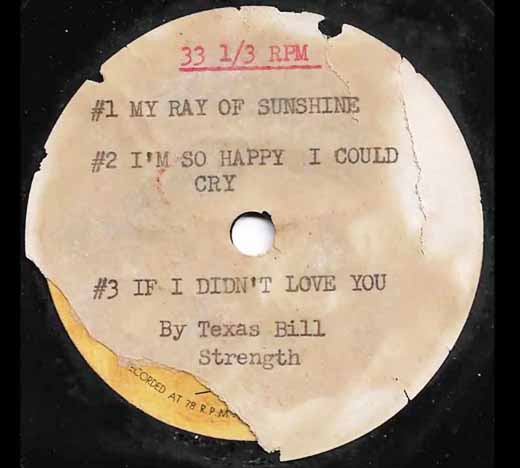
CORAL RECORDS
In December 1953, Coral appears to have dropped several of its C&W artists to concentrate on just a few. TBS survived the cut. The strategy was to issue fewer releases and promote them more vigorously. (Billboard, December 26, 1953)
Coral Records is entering the country and western field with a regular release schedule. Initially, releases will be pushed out at the rate of three and four records per month, according to A&R topper Bob Thiele … Thiele has appointed Johnny Thompson to head up the Coral C&W operation in Nashville… Thompson opened Coral’s Cincinnati and Atlanta branches. He has pruned Coral’s C&W roster to three artists – Tommy Sosebee, Texas Bill Strength and Tabby West. He is negotiating with two name artists.
(Billboard, December 5, 1953)
A two-hour “hillbilly show and dance” was presented at the Sports Arena in Atlanta on December 17, 1953, under the auspices of the National Association of the Handicapped. The Atlanta Constitution reported that all proceeds from the show would be used to assist “physically handicapped persons who have lost one or more members of their body or who have been disfigured and are unable to obtain normal employment.” A list of performers, culled from the Atlanta Constitution, the Atlanta Journal, and Billboard, included:
- TBS
- Peachtree Cowboys
- Kenny Lee
- Romeo Brinkley’s Cain Street Cowboys
- Leon Beavers and his Las Vegas Seven
- Slick and Greasy
- Armand Herron
- Tom Gibson from WATL
Prizes donated by Atlanta merchants were distributed, with the shindig drawing to a close with a dance by Ray Rice and His Rhythm Aces.
(Atlanta Journal, December 16, 1953; Billboard, January 9, 1954)
HILLBILLY BALL
A Hillbilly Ball was held at Atlanta’s Municipal Auditorium on December 22, 1953, and “went on til Milkin’ time” with:
- Jack and Frances Holden
- Boots Woodall
- Smith Brothers
- TBS
- Kenny Lee
- Jimmy Smith
- Peachtree Cowboy
- Uncle Eb Brown
- Tom Gibson
- Leon Beavers
- Warren Roberts
- David Jones
- Tom Lowe
- Tom Noland, and
- Cuzzin’ Lem
(Billboard, January 9, 1954)
Another Hillbilly Ball was held on New Year’s Eve, 1953, at the Atlanta Municipal Auditorium. The Atlanta Journal claimed that the Ball, at $1 a person, was the biggest New Year’s Eve celebration at the price in Atlanta. (December 24, 1953) Entertainers included:
- TBS
- Rocky Porter and the Rockettes
- Jack Holden and the Still River Boys
- The Peanut Stompers
- Uncle Eb Brown, R.L. MCoy, square dance caller
The action started at 8:30 and continued till milkin’ time.
No dates were given, but in the Spring 1954 issue of the Houston Star, Bill reported that he had show dates in
- Memphis
- Birmingham
- Dayton
- Cincinnati
- He had also appeared with Ernest Tubb on his Midnight Jamboree show over WSM in Nashville.
1954
January 1954
The Atlanta directory listed TBS as an announcer on WEAS in Decatur, living at 124 Jewel.
Folk talent galore played host to the March of Dimes at Atlanta’s Tower Theater [late January, 1954]. Among those participating were:
- The Smith Brothers
- Boots Woodall
- Pat Patterson
- Little Brenda Tarpley
- Jon Farmer
- Bill Lowery
- John Carroll and Little Donny
- TBS
- Bobby and Mack Atchinson
- Jerry Howell
- The LaFatterairs
- Jack Holden
- Kenny Lee
- Tom Gibson
- Romeo Brinkley
(Billboard, February 6, 1954)
TBS was a featured performer at a Big Round and Square Dance at the Alabama National Guard Armory in Birmingham on January 30, 1954. Also on the bill was Kenny Lee. The dance was sponsored by radio station WVOK.
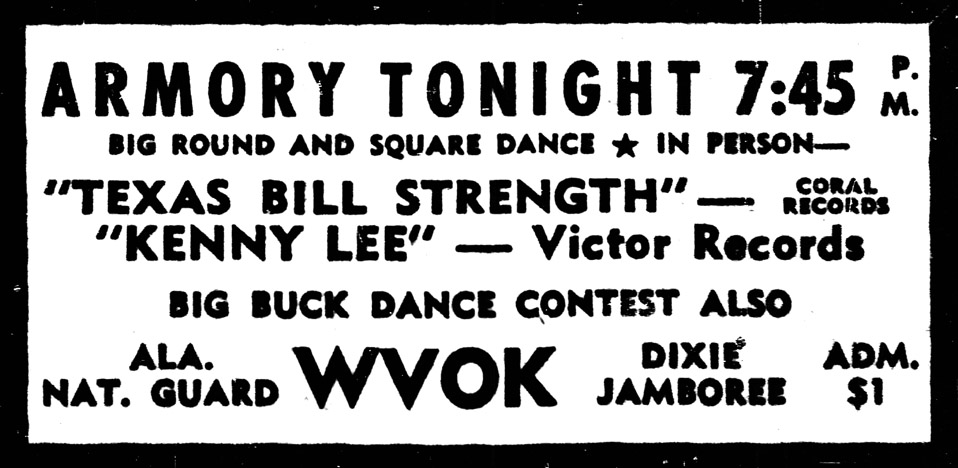
On January 26, 1954, Bill played a Sunday show with Fuzzy “St. John,” so reported the Spring 1954 Houston Star.
February 1954
On February 14, 1954, TBS had a 22-minute interview with DJ Marty Roberts over WCKY, Cincinnati. Both sides of his Coral record were played. (Houston Star, Spring 1954)
WEAS, Decatur, Georgia, is going to 50,000-watt strength in February, with TBS and Jack Holden handling the disk jockey chores. (Billboard, January 16, 1954) TBS was holding up the 11 am to 12:30 pm and 5:45 to 6:45 slots, Monday through Friday.
March 1954
TBS guested on Marty Roberts’ WCKY, Cincinnati, show recently. (Billboard, March 6, 1954)
April 1954
CORAL RECORDS
On April 8, 1954, TBS and Tabby West (nee Phyllis Spain) recorded two sides on Coral. This would be the sixth recording session on Coral.
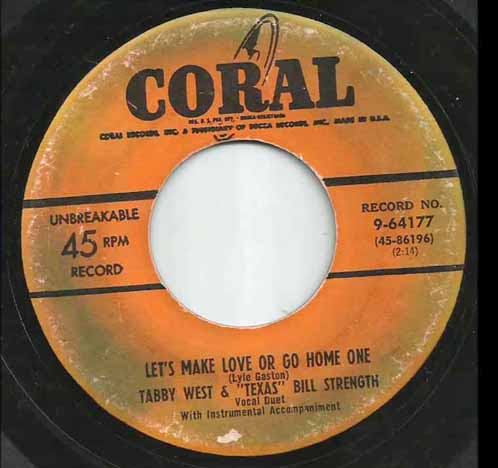
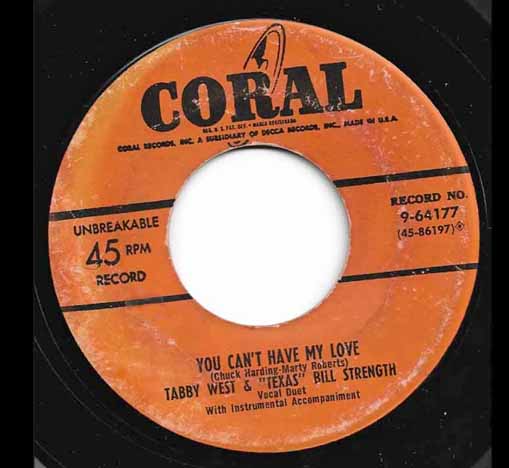
Coral 64177 was released in June 1954 and reviewed in Billboard on July 3, 1954:
- “Let’s Make Love or Go Home” – Tabby West and TBS team up for a saucy reading of a happy novelty effort. Side is cheery, and it could get spins.
- b/w “You Can’t Have My Love” – Old-fashioned opus is sparked by the vocal of the thrush and the sweet-talk of chanter Bill Strength.
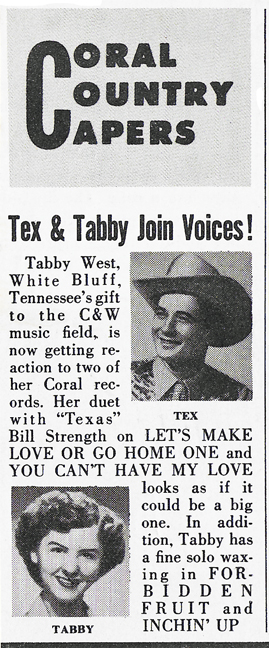
SILVER SLIPPER
TBS’s ownership of his night club, the Silver Slipper, was about to come to an end, but he still had an interest in it in 1954, as evidenced by the following ad from the Atlanta Journal (April 30, 1954):
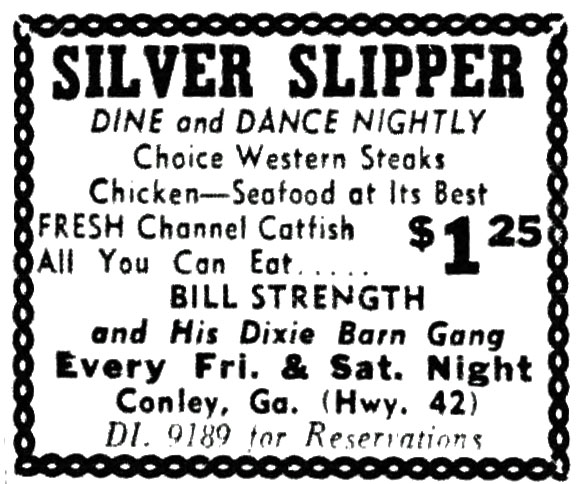
May 1954
The Nashville Banner reported that Tabby West and TBS completed another Coral recording session on or before May 7, 1954 (the date of the article). The titles were due for a rush release, according to Coral execs. As far as we know, the sides were never released. The were:
- Forbidden Fruit
- Inchin’ Up
On May 15, 1954, TBS and Jimmy Skinner played the Midway Jamboree in Gadsden, Alabama, with Lee Bonds, Little Rita Faye, and others.
On May 16,, 1954, Curtis Gordon and TBS promoted a show at the East Point, Georgia, Auditorium, with Autry Inman, Jimmy Skinner, Little Rita Faye, and many others. (Houston Star, Summer 1954)
The second annual Jimmie Rodgers Memorial celebration took place on May 25 and 26, 1954, and Bill was looking forward to promoting his latest releases, “Country Love” and “Alone,” reported the Houston Star.
The ad below for TBS and WEAS radio appeared in the Spring 1954 edition of the Houston Star. He had worked for WEAS since April 1952.
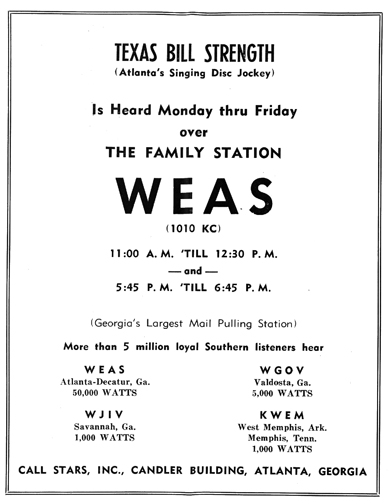
June 1954
TBS appeared on the cover of the June 1954 issue of Cowboy Songs, and was one of three artists featured in the issue.
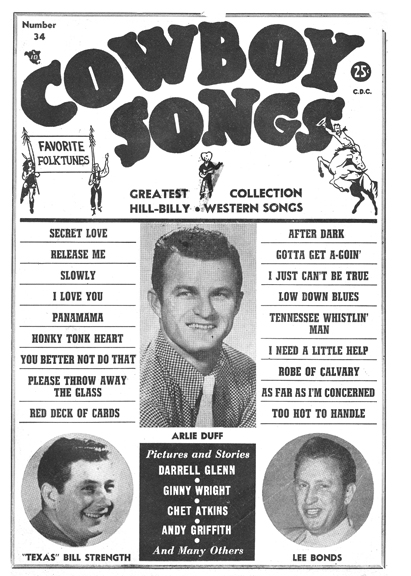
TBS was still having fun at the Silver Slipper, apparently.
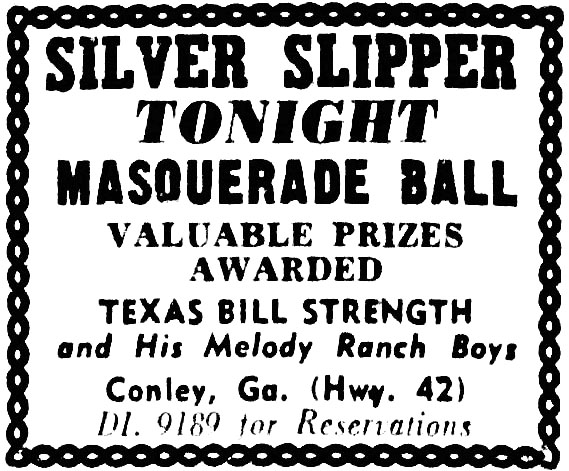
The Houston Star (Summer 1954) named his Melody Ranch Boys to be:
- Buddy Pattilo, fiddle
- Jimmy Estes, electric bass
- Lamar Hawkins, electric guitar, drums, and mandolin
- Shorty Boyd, steel guitar
- Terry O’Neal, rhythm guitar
The Melody Ranch Boys were also heard daily at 7:15 pm over WEAS.
TBS was apparently teaming up with Jimmie Skinner to do some one-nighters.
On June 12, 1954, Billboard reported that the two did a show at La Grange, Georgia.
Then on June 18, the Nicholasville, Kentucky News Week advertised a stage and screen show, with stage shows at 3:45, 7:45, and 9:45. The movie was “Tennessee Champ.”
Summer 1954
A summer 1954 article in Country Song Roundup‘s Fifth Anniversary Issue which featured spotlights on disc jockeys from around the country offered the reader some quotes attributed to Texas Bill that give us perhaps some insight into music and his career:
Since I began singin’ about ten years ago, I have always felt that Country music was a part of my life. I have taken it for granted that it is the only business that I should be in. Within these ten years, I have been associated with many types of people who tell a story. Some tell their story in a speech, others in books, and yet, there are people who can better tell a story in song. … and I guess that’s why I’ve been inspired to since my boyhood, to tell my story in a song.
In addition to music being a part of my daily life, I think it is one of the most gratifying things that could ever happen to an artist. Why? Because when I make other people happy with a song, either on a show date or by playing records on my D.J. shows, I feel that I am reaching my goal—I’m living Country Music!
July 1954
TBS played a string of 10 dates in Ohio, Kentucky, and Indiana with Jimmy Skinner recently. (Billboard, July 17, 1954)
Hank Snow, the Smith Brothers, and TBS played to 15,000 music and baseball fans in Atlanta last week. (Billboard, July 24, 1954)
August 1954
George Riddle, 18-year-old country DJ at WMRI, Marion, Indiana, had TBS and Lonzo and Oscar as guests recently. (Billboard, August 21, 1954)
TBS, WEAS, Decatur, Georgia, continues with his name act policy at his Silver Slipper there. (Billboard, August 28, 1954)
September 1954
MEMPHIS
In September 1954, TBS was moved to Memphis where WEAS had a sister station, KWEM, in West Memphis, Arkansas. He formed a new band, the Swingsters, and played two nights a week in a club at 5100 Summer Ave. in Memphis. (Ronnie Pugh)

It was the same time that Elvis, Johnny Cash, and Sun Records were discovering rock ‘n’ roll, and Memphis was an exciting place to be. Bill had so many personal appearances in the Memphis area and around the country, that it was amazing that he could keep his DJ job at the same time, but he stayed at KWEM from September 1954 until he moved to Minnesota in November 1955.
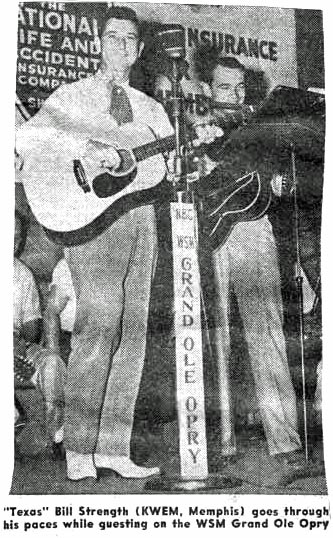
TBS AND ELVIS
An article called “Elvis Before Sun” (Examiner.com) by an unknown author dated October 12, 2010, posits that in September 1954, when TBS was moved to station KWEM in West Memphis, he became friends with Elvis Presley, and Elvis appeared live on KWEM Radio twice in 1954 before he signed with Sam Phillips at Sun Records. In one of those performances, he sang with Johnny Burnette and the Rock n’ Roll Trio. Scotty Moore and Bill Black, who played on Elvis’ Sun releases, appeared live on KWEM in 1954 with their first band, the Starlite Wranglers. Elvis performed with the Starlite Wranglers, who also released their own record on the Sun label.
Elvis’ high school friend, George Klein, started working at KWEM at about the same time that Elvis released his first Sun record in 1954. George started at KWEM part-time before moving into mornings and seeing his first ratings success there, before moving on to WMC and then WHBQ in Memphis.
Legend has it that Elvis walked into Sun Studios to record a song for his mother but that doesn’t seem to be the case. No doubt he did go to Sun to record a song for his mother, but Sam Phillips most likely heard Elvis first on KWEM.
Many of the artists Sam signed he heard first on KWEM, including B.B. King, Howlin’ Wolf, Ike Turner, Stan Kessler, Smokey Joe Baugh, Paul Burlison, Barbara Pittman, Jean Chapel and the Miller Sisters.
Could it be that TBS gave Elvis his first radio exposure before the legendary Dewey Phillips discovered “That’s All Right,” played it incessantly on his program on WHBQ on July 8, 1954, and was given credit for putting Elvis on the radio for the first time?
Unfortunately, the theory doesn’t hold water when looking at the calendar. If TBS didn’t start working at KWEM until September 1954, and Dewey Phillips played the record in July… whoops! Nevertheless, TBS and Elvis did become lifelong friends, and both recorded at Sun Studios.
Another side note about Bill and Elvis and all of the musicians who recorded at Sun Studios. Dorothy said it was only then that Bill started to have a bit too much fun, stay out too late, drink too much, and get into habits that would prevent him from becoming reliable enough to fulfill his dreams.
“TBS will be Mr. Disc Jockey on the September 10 show from WSM, Nashville.” (Billboard, September 4, 1954) Ronnie Pugh reported that a large contingent of his fan club crowded the WSM studios for the event.
Marty Roberts, platter spinner at WCKY, hopped into Atlanta for an appearance at TBS’s Silver Slipper Club. (Billboard, September 11, 1954)
On September 17, 1954, TBS played Sleepy-Eyed John’s Eagles Nest with Webb Pierce and the Wilburn Brothers. (Billboard, October 2, 1954)
HANK WILLIAMS DAY IN MONTGOMERY
September 20 and 21, 1954, marked the second observance of Hank Williams Memorial Day in Montgomery, Alabama. The first Hank Williams Day was arguably March 31, 1953, although it did not appear to be a gathering but a memorial held by radio stations. Williams died on January 1,1953.
This second Hank Williams Memorial Day drew more than 200 C&W DJs and performers to Montgomery. The event was sponsored by the Alcazar Temple of the Shrine. The event was highly publicized in the Montgomery Advertiser-Alabama Journal.
An early article advertising the event prominently featured TBS’s photo and bio on the front page:
To take a brief sampling might here give you some idea of the variety of talent already scheduled.
Start with Texas Bill Strength. Former star of a Texas network and a chain of 126 other stations, he now has turned disc jockey. He has three daily DJ shows over 50,000 watt WEAS in Decatur, Ga. Additionally he has a swing-band, the Melody Ranch Boys, and his own club, the Silver Slipper, near Atlanta. (August 29, 1954)
TBS was described as coming to the event from Houston, and whose latest recording, “You Can’t Have My Love,” was becoming a nation-wide hit.
The itinerary was as follows:
Monday, September 20: This evening was dedicated to performances by artists from Williams’ home state of Alabama.
Late Monday afternoon, a group of performers entertained some 200 GIs at the Maxwell Air Force Base hospital with a 30-minute impromptu show.
This was followed by a huge free show to about 8,500 people at the recently-opened Normandale shopping center, where special honors were given to Hank Williams’ mother, sister, and his widow, Audrey. A life-sized portrait of Hank was presented to his mother.
A combined crowd of about 2,800 attended three dances held Monday night at Fort Dixie Bibb Graves Armory, the Alcazar Shirne Temple, and the City Auditorium, with the various artists doubling between the three spots..
Tuesday, September 21:
Delegates journeyed to Oakwood Annex Cemetery to place a wreath on Williams’s grave.
TBS and his band paid a visit to the grave of Hank Williams in Montgomery.
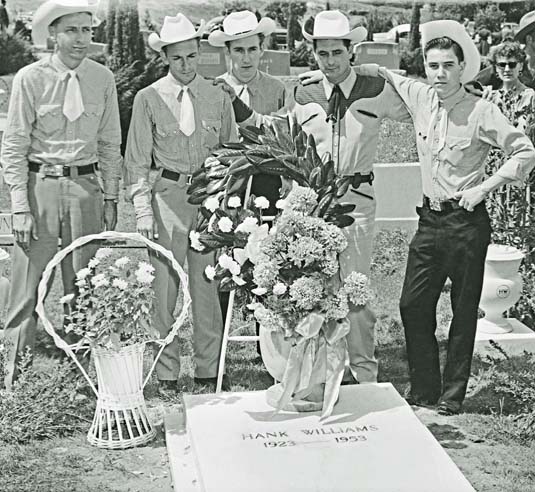
There was a huge parade featuring Governor-Elect Big Jim Folsom, witnessed by an estimated 60,000 people. It took an hour for the parade to pass a given point.
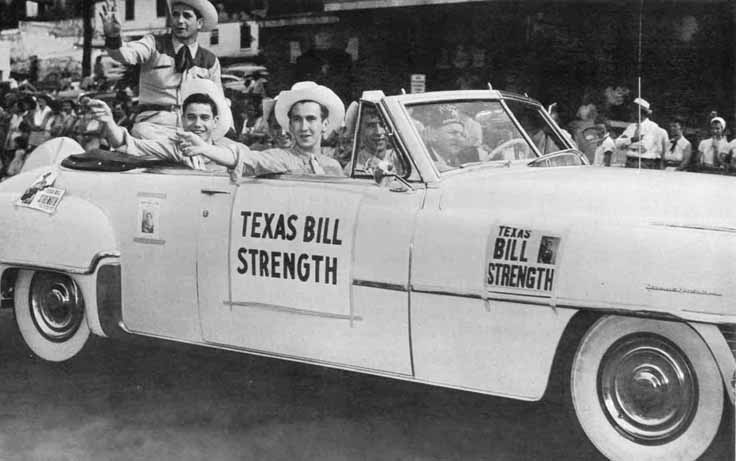
Climaxing the event was the headliner show at the Cramton Bowl, seen by about 8,500 people. Tennessee Governor Frank Clement was the principal speaker. Audrey and her children Lycrecia and Hank Jr. unveiled an 11 foot marble monument of Williams which was to be placed on his grave. (Billboard, October 2, 1954)
On September 25, 1954, TBS did a “Youth for Christ” charity show with Roy Rogers, Dale Evans and the Sons of the Pioneers. (Billboard, October 2, 1954)
October 1954
TBS, who recently transferred from WEAS, Atlanta, to KWEM, Memphis, is doing a three-hour deejay stint daily plus a 15-minute live show. (Billboard, October 2, 1954)
TBS will appear at his own nitery, the Silver Slipper, Atlanta, on October 9, 1954, with his Melody Ranch Boys. (Billboard, October 9, 1954)
Elvis Presley, with his guitar and bassmen, Scotty and Bill, made an appearance recently at TBS’s nitery [The Silver Slipper] in Atlanta. (Billboard, October 23, 1954)
TBS, still featured on KWEM, Memphis, played his own Silver Slipper nitery, Atlanta, on October 30, 1954, and then embarked on a string of personals that will keep him busy for some time. (Billboard, November 13, 1954)
November 1954
On November 6, 1954, TBS played the “Barnyard Frolics,” Little Rock, with Sammy Barnhart (Okeh). (Billboard, November 13, 1954)
On November 13, 1954, TBS played Birmingham. (Billboard, November 13, 1954) While in Birmingham, TBS guested with Joe Rumore and Dan Brennan at WVOK, Buddy Starcher at WLBS, and Uncle Jim Atkins at WBRC. (Billboard November 27, 1954)
On November 13, 1954, Billboard polled C&W artists to determine which disk jockeys were doing the best job promoting their music. TBS was tied with four others at Number 50 out of 55; his station was listed as KWEM.
On November 15, 1954 TBS appeared in Sheffield, Alabama, with Webb Pierce and Red Sovine. (Billboard, November 13 and 27, 1954)
On November 16, 1954, TBS, Webb Pierce, and Red Sovine appeared in Ripley, Mississippi. (Billboard, November 13 and 27, 1954)
On November 17, 1954, TBS appeared with Webb Pierce, Red Sovine, Bob Neal, and “Many More!” in a Great Two-Hour Jamboree at the Catholic Club Auditorium in Helena, Arkansas.

On November 18, 1954, Webb Pierce and Red Sovine again headed the bill for another two hour jamboree in Owensburg, Kentucky. Audrey Williams was also on the show, plus one of the Wilburn Brothers.
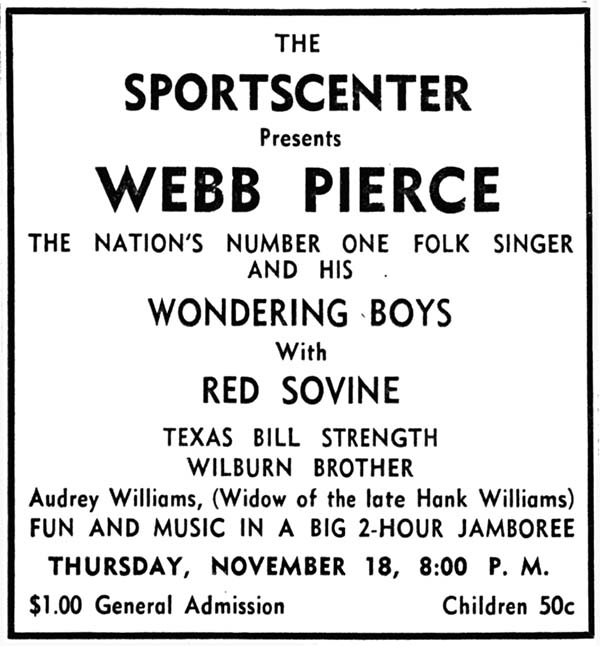
In November 1954, TBS was scheduled to attend the deejay conclave in Nashville. (Billboard, November 13, 1954)
In late November 1954, TBS was scheduled to play the Roosevelt Lounge in Detroit. (Billboard, November 13, 1954)
On November 28, 1954, TBS was on the bill for a Stars of the Grand Ole Opry package show at the Memphis Auditorium. The show also included:
- Johnnie and Jack
- Kitty Wells
- The Tennessee Mountain Boys
- Cousin Nimrod
- Sonny James
- Chuck Reed
- Bud Deckleman
- Tiny and the Eagles
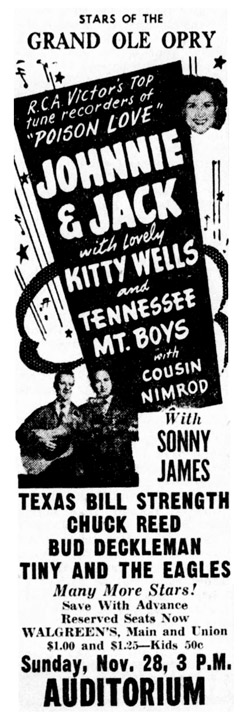
December 1954
On December 8, 1954, TBS, Elvis, and the Parker Bros. Band performed at the P&G car lot in West Memphis, Arkansas. This ad was quite a remarkable find by Dale!
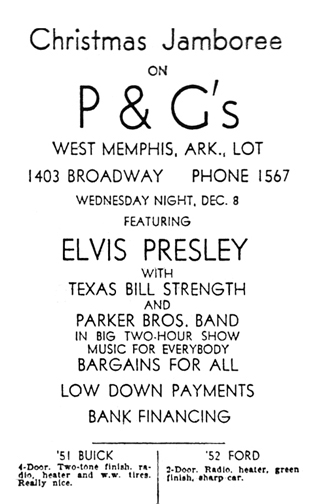
Here’s another one, with a fun admonition from Elvis at the bottom:
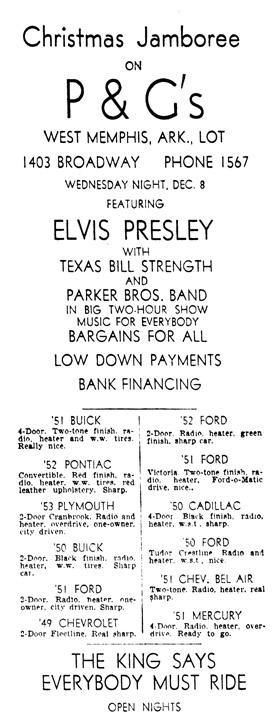
On December 23-25, 1954, TBS played Houston and then hopped back to Memphis to resume his chores at KWEM there. (Billboard, January 8, 1955)
One of those appearances was in the ad below, and was also mentioned in Charlie Evans’ “Night and Day” column in the Houston Chronicle. Evans: “Special guest will be Texas Bill Strength, who has been hitting the big-time shows through the South.”
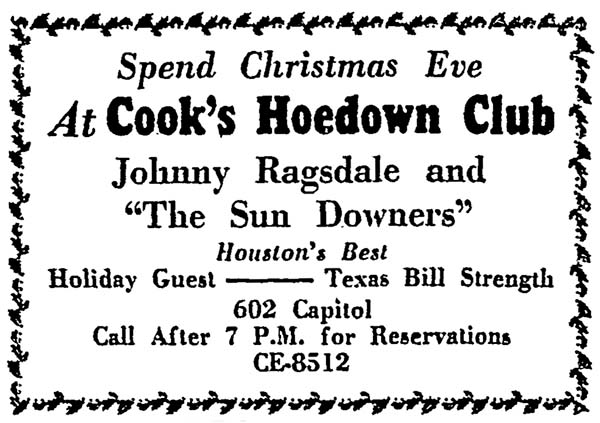
Here is another Christmas appearance; in 1954, December 25 fell on a Saturday night.
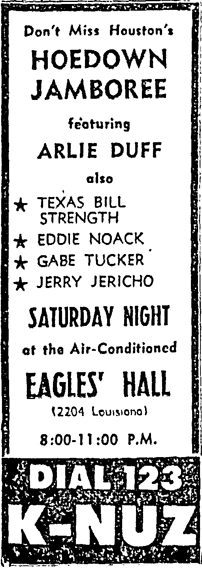
1955
January 1955
TBS is set to play a string of dates with Jim Edward and Maxine Brown and Elvis Presley after the first of the year. (Billboard, January 8, 1955)
TBS played a place in Memphis called the Palms in mid-January 1955.
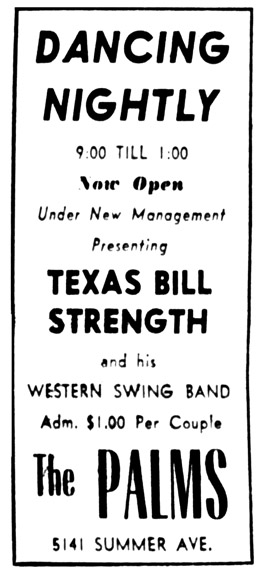
On January 29, 1955, TBS was a guest on “Grand Ole Opry” with Faron Young. (Billboard, February 12, 1955)
February 1955
On February 5, 1955, TBS appeared on the “Ernest Tubb Jamboree” on WSM, Nashville. (Billboard, February 12, 1955)
TBS was the feature on “Barnyard Frolic” over KLRA, Little Rock. (Billboard, February 12, 1955)
March 1955
TBS visited the country deejays in Birmingham and Atlanta last week after winding up on a chain of 14 theaters in Arkansas and Mississippi. (Billboard, April 2, 1955)
Spring 1955
In the Spring 1955 issue of the Houston Star, TBS was pictured with “White Flash,” an Arabian Stallion. In the Summer 1954 issue there was an ad for a place called the Poney Ranch, so it was probably taken there.
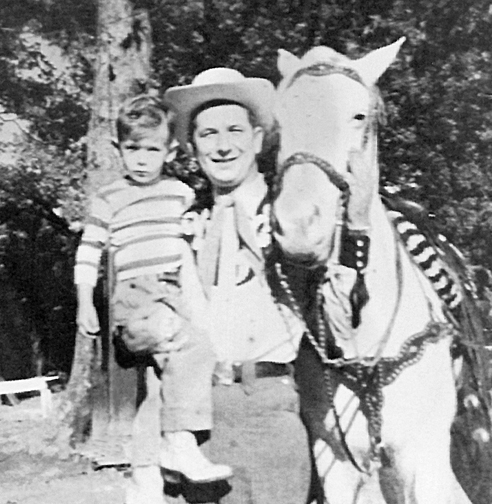
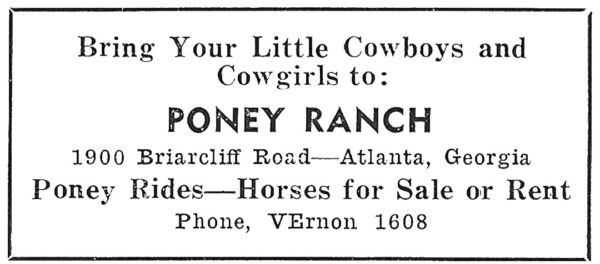
May 1955
THE DEATH OF BROTHER CHARLIE
On May 1, 1955, TBS flew to Houston to attend the funeral of his 19-year-old youngest brother, Charles E. Strength, who passed away on April 30, 1955, in Pasadena, Texas. Charlie was a 19-year-old student at the time. Although TBS reported to Billboard that he died from an auto accident (Billboard, May 14, 1955), in truth, Charlie committed suicide. In an interview with his mother Dorothy, Dale discovered that Charlie had often spoke of killing himself, although she wasn’t sure of the reason. TBS and Dorothy had tried to get Charlie to live with them in Atlanta, but his mother didn’t want him to.
Below is a photo of Charlie, taken just before he passed.
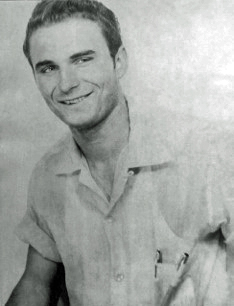
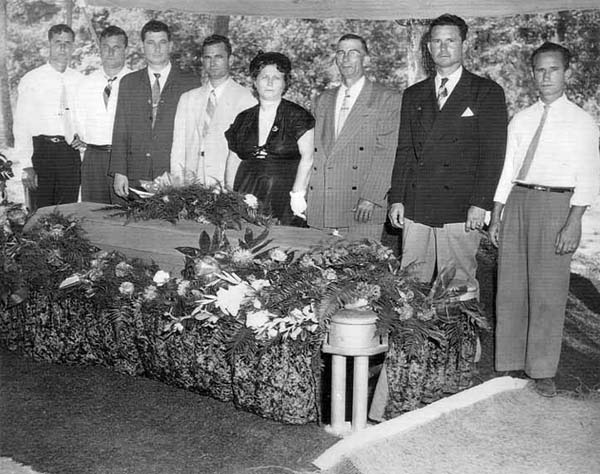
In the photo above, the story of Eugene, Jessie’s first son, is pretty clear, since he is nearly a foot taller than the rest of the Strength boys. TBS is probably the tallest of the Strength brothers, at either 5’ 8” or 5’ 9” (depending on the source). Eugene’s military registration card wasn’t found on Ancestry.com, which is a good source of height and weight, but the photo seems to show that his father must have been bigger than William T. Strength, Sr.
The absence of brother Arthur (“Pete”) is explained by the fact that on June 5, 1950, he began a six-year sentence at Huntsville prison for stealing a motorcycle in New Orleans and driving it to Houston. He had been working as a messenger boy in Houston, and was convicted at the tender age of 18. Dorothy’s mother, “Big Momma,” helped him get paroled, but not in time for the funeral.
On May 13, 1955, TBS was set to embark on a 14-day tour of one-nighters thru Texas, Colorado and California. The trek forced Strength to miss the Jimmie Rodgers Memorial Day celebration in Meridian, Mississippi, May 25-26. (Billboard, April 2, 1955) [Later on Billboard says that he did make it.]
On May 16, 1955, TBS appeared with Curly Fox and Biff Collie over KPRC-TV, Houston. (Billboard, May 21, 1955)
From May 19-24, 1955, TBS was set on swing that’ll carry him from Port Isabell, Texas, to Mexico City. (Billboard May 21, 1955)
On May 21, 1955, TBS was on KWEM, West Memphis, Arkansas. He had recently been signed to Capitol Records in Hollywood. He also signed with Hollywood agent Bobbie Bennett. (Billboard, May 21, 1955)
Bennett was a Hollywood agent who had worked with Spade Cooley. She helped him find guest spots on several major shows while he was on the West Coast during the summer of 1955.
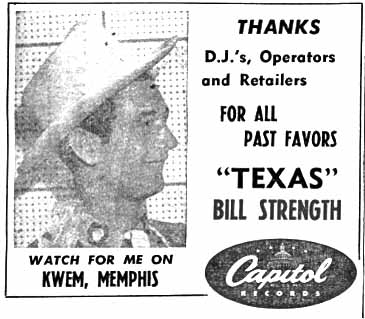
The Spring 1955 issue of the Houston Star reported that TBS had been a guest of Carl Smith on the Grand Ole Opry lately.
SOJOURN TO HOLLYWOOD
Following the Jimmie Rodgers Celebration in Meridian, Mississippi on May 25-26, 1955, TBS headed back home to Memphis to reload another suitcase and then hit out for the West Coast and a Capitol Records session. (Billboard, June 11, 1955)
On May 28, 1955, TBS was scheduled to appear in the feature slot on the “Big D Jamboree” in Dallas. (Billboard, May 21, 1955) (With Slim Whitman, (Billboard, May 28, 1955) (With Arlie Duff, (Billboard, June 4, 1955)
June 1955
On June 14, 1955, TBS pulled a packed house to the Ritz Theater, Parkin, Arkansas, with the result that he was held over the following night. (Billboard, July 2, 1955)
Somehow, between June 14 and June 25, 1955, according to this timeline, TBS made it from Arkansas to Hollywood. He was back in Memphis on July 4.
On June 25, 1955, TBS does a stint on Cliffie Stone’s “Hometown Jamboree” in Hollywood. (Billboard May 21, 1955).
July 1955
On July 4, 1955, TBS was booked to emcee the “Grand Ole Opry” package to be presented at Russwood Ball Park, Memphis, sponsored by the local chapter of the Cerebral Palsy Fund. The show was promoted by Elmer Yates. The lineup included:
- Ernest Tubb
- Goldie Hill
- Faron Young
- Wilburn Brothers
- Marty Robbins
- Carter Sisters
- Rod Brasfield
- Minnie Pearl
- Sleepy-Eye John of WHHM
(Billboard, May 21, 1955)
On July 22, 1955, TBS (Capitol) had an engagement at the Coldwater Theater, Coldwater, Mississippi. Afterwards he headed for the West Coast, where he’s booked thru August 1 by the Bobby (sic) Bennett Agency, Hollywood. (Billboard, July 30, 1955)
Can you drive from Mississippi to Arkansas in one day?
RED FOLEY – July 23, 1955
TBS was tentatively set to appear with Red Foley’s TV network show June 18. (Billboard, May 21, 1955)
TBS has had his guest appearance on Red Foley’s “Ozark Jubilee” ABC-TV network show shifted to July 23. (Billboard, July 2, 1955)
En route [from Mississippi on July 22, ] TBS stopped off in Springfield, Missouri, Saturday (23) for an appearance on Red Foley’s “Ozark Jubilee.” (Billboard, July 30, 1955)
En route to the West Coast, Strength guested on the Ozark Jubilee. (Billboard, August 17 and 27, 1955)
Now Bill had from July 24 to July 29 to make it from Missouri to Los Angeles for his Capitol Records recording session.
Ronnie Pugh wrote that he drove 135 miles between Tulsa and Oklahoma City to visit Hank Thompson. And then he drove the rest of the way to Hollywood across the desert with the top down.
CAPITOL RECORDS
On July 29, 1955, TBS had his first Capitol recording session. He recorded four sides:
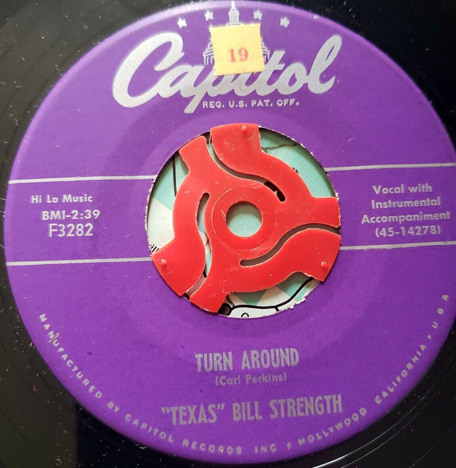
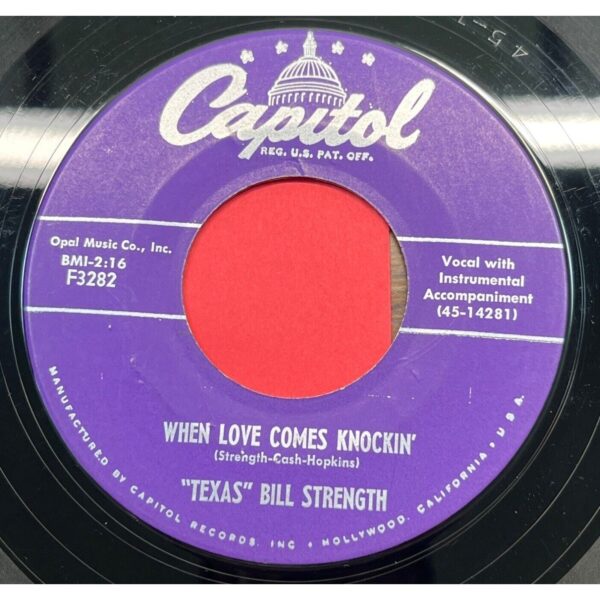
Capitol F3282 was released in November 1955, and was reviewed by Billboard on November 12, 1955:
- “Turn Around” – “A strong country ballad with a good melody line and effective lyrics. Texas Bill gives a fine performance. Will get strong deejay action.”
- b/w “When Love Comes Knockin’” – “Fine country rhythm side, belted out in great fashion by Texas Bill, to a lively backing featuring strings and honky tonk piano. Watch it.”
“Turn Around” was included on a Record List on an ad by McLean’s Records in the Newport News Daily Press, published on December 2, 1955.
An unusual independent review of this record was found in the Wichita Eagle, published on January 8, 1956:
- Texas Bill Strength has strength in the vocal lines of “Turn Around.” His drawling voice presents a love song of the usual pickin’ and singin’ style. Piano, violin and steel guitar keep the background lively. A movable harmony between instrumentalists is notable.
- “When Love Comes Knockin’” is on the other side and on this one Texas Bill had a hand in the composition. A slappy, happy bit, it has some hot solo by violin and fast fingering on the piano part while the whole features jump rhythm and a hoedown tang.
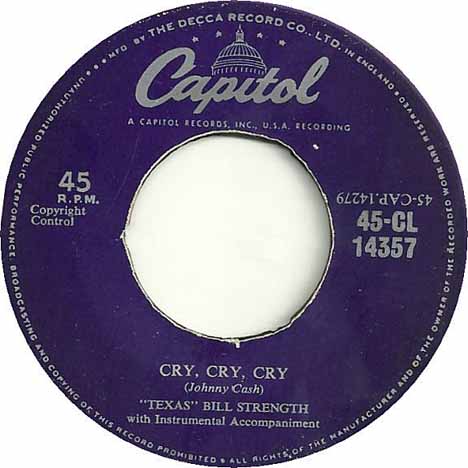
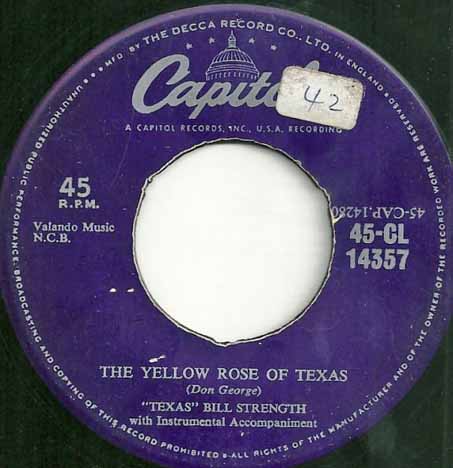
CRY, CRY CRY/YELLOW ROSE OF TEXAS
Judging from the record numbers, Capitol must have released “Cry, Cry, Cry” (F3217) b/w “Yellow Rose of Texas” first, although we have no release date or Billboard review. The Los Angeles Times reported on the release of “Yellow Rose” on August 11, 1955. The story of the record is interesting:
Wikipedia reports that Johnny Cash was signed to Sun Records in 1954 and brought Sam Phillips the song “Hey Porter,” which he had written while in the Air Force. He was told to come back with a more commercial song, and overnight he wrote “Cry! Cry! Cry!” His first record featured “Hey Porter” as the A side and “Cry, Cry, Cry,” as the B side. The latter entered the Country charts at No. 14. It was standard at the time for other artists to immediately cover songs.
Ronnie Pugh speculated that TBS may have been the first artist on a major label to record a song written by Johnny Cash. Below is an excerpt from a TBS’s “Down Memory Lane” column that he wrote for Upper Midwest Country & Western News Scene magazine, published in September 1973:
I like to remember the first day I met Johnny. In the summer of 1955, I was doing my daily DJ show when Johnny walked into the studios of KWAM (sic) in [West] Memphis, very much unknown to anyone … He talked to our station manager and made a tape of a few of his songs … which were later to be recorded for Sam Phillips and the Sun label … A few weeks later, I had the pleasure of being the first DJ to play the first Johnny Cash record, “Hey Porter” … Since my show was made up of requests, the mail began pouring in for Johnny Cash records. John was a top mail puller and soon became the hottest artist on the turntables all across the nation. Before making his first recording, Johnny had been an appliance salesman in Memphis.
I had just been signed by Capitol Records at the time, and I flew to Hollywood and recorded his “Cry, Cry, Cry” … I knew it was a hit song and was hoping to reap some of the sales gravy. The big wheels at Capitol agreed it was a hit … I recorded it on Friday morning and the following Tuesday the D.J. samples were shipped from Capitol’s pressing plant … A rush release … and even though I was on a major label, I still couldn’t compete with the Johnny Cash record of “Cry, Cry, Cry” …
Luckily, I had “The Yellow Rose of Texas” on the flip side, so they turned it over and made “Rose” the push side; and as a result, John and I both had a hit.
The letter below appears to have been sent to a fellow disc jockey, gently urging him to keep spinning “Cry, Cry, Cry.”
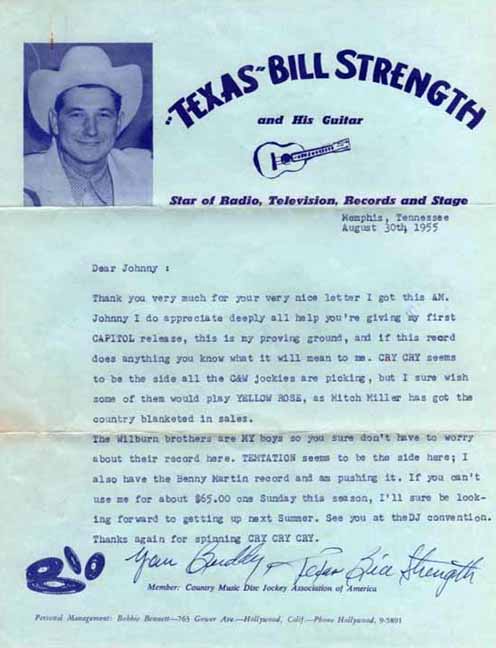
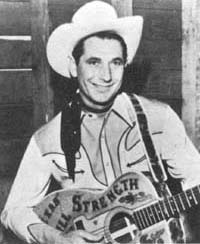
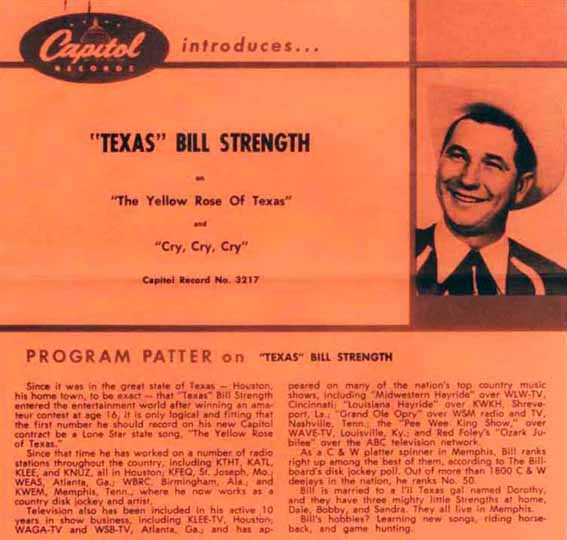
On Saturday, July 30, 1955, TBS appeared on Spade Cooley’s TV show, KTLA-TV, Hollywood. Bill has just taken delivery on a new 45-foot, air-conditioned house trailer, a new ’55 benzine buggy. (Billboard, July 30, 1955)
An undated list of “Recent Appearances” notes that TBS had appeared on the Spade Cooley Show twice.
During his recent trek to Hollywood for the Capitol session, Strength made a successful screen test, with negotiations under way to spot him in a Western feature soon. (Billboard August 20, 1955)
August 1955
On the Coast, TBS:
- Visited with Tex Ritter and Wade and Stuart Hamblen
- Appeared on “Town Hall Ranch Party,” KTTV in Hollywood, with Ritter, Johnny Bond, Wesley and Marilyn Tutt and Freddie Hart
- Appeared with Jolly Joe Nixon and Cliffie Stone over KXLA, Pasadena
- Appeared with Hank Penny and Sue Thompson at Riverside Rancho
(Billboard, August 27, 1955)
OVERTON PARK SHELL, MEMPHIS
On August 5, 1955, TBS appeared on Bob Neal’s eighth and last “Anniversary Jamboree” at the Overton Park Shell in Memphis. Just as Elvis had made his first professional performance at the 1954 event and blown the 4,000 people in the audience away, in 1955 it was Johnny Cash’s time to shine. Hear TBS’s announcement of the show that he made the day before, on his radio show HERE.
- Webb Pierce
- Elvis Presley, Scotty and Bill
- Wanda Jackson
- Bud Deckleman
- Johnny Cash
- Sonny James
- Red Sovine
- Jim Wilson
- Charlie Feathers
- The Neal Boys

Dick Stuart, WMPS Memphis, wrote to Billboard that “The biggest country show ever to play Memphis pulled a record-breaking crowd of over 4,000 people to the Bob Neal ‘Eight Anniversary Jamboree’ at Overton Park Shell.”
The performers “kept the crowd on the edge of their seats for well over three hours, despite threatening skies. On the Neal anniversary one year ago, Elvis Presley made his debut, and was a sensation. This year Johnny Cash broke thru as the outstanding new act in Memphis. I’m handling him.” (September 17, 1955)
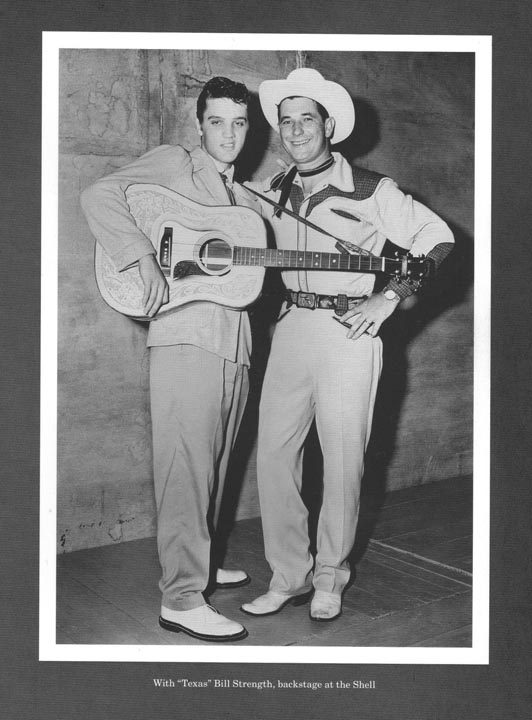
The Memphis Press Scimitar of August 6, 1955 also reported that the troupe also visited Little Rock, Arkansas; Sheffield, Alabama; Camden, Arkansas; and Tupelo, Mississippi that week.
On August 6, 1955, TBS did a stint on the “Grand Ole Opry” in Nashville, and the Ernest Tubb “Midnight Jamboree” over WSM. (Billboard, August 20, 1955)
On August 7, 1955, TBS appeared as a guest at Roy Acuff’s Dunbar Cave in Clarksville, Tennessee, with Faron Young, the Wilburn Brothers, and Eddie Hill. (Billboard, August 20, 1955)
On August 13, 1955, TBS was due in Cincinnati for a visit with local disk jockeys and other friends. He has just returned from the West Coast, where he cut his first session for Capitol. (Billboard, August 13, 1955)
On August 14, 1955, TBS left Memphis for a two-week promotional tour in the interest of his initial Capitol release, “Yellow Rose of Texas,” b/w “Cry, Cry, Cry.” He has stop-offs skedded for Louisville, Indianapolis, Cincinnati, Chicago, Philadelphia, New York, Washington and other Eastern cities. (Billboard, August 20, 1955)
In August 1955, TBS was back in Columbia, Tennessee, after a jaunt to the West Coast that offered him the opportunity “of guesting on a number of shows and visiting with folk artist friends.” (Billboard, August 27, 1955)
TBS was a visitor at the home office of The Billboard last week [late August] while in Cincinnati to promote his initial Capitol release, “Yellow Rose of Texas” b/w “Cry, Cry, Cry.” He also guested with various local deejays during his Cincy stay. (Billboard, September 3, 1955)
September 1955
And then there’s Abdalla’s Furniture Store, “Southwest Louisiana’s Largest and Finest,” which also sold Popular, Race, and Hillbilly records. For five weeks in September and October 1955 we see Hit Records charts in the Opelousas, Louisiana, Daily World, with TBS’s “Cry, Cry, Cry” b/w “Yellow Rose of Texas” taking various places on the Hillbilly chart, although they are not numbered. Also, the two sides change from week to week.
On September 10, 1955, TBS played the “Barnyard Frolic” at Robinson Auditorium, Little Rock. Show is emseed by Sammy Barnhart (Decca) and airs over KLRA. (Billboard, September 24, 1955)
The Beatttyville (Kentucky) Enterprise reported on September 15, 1955, that TBS “dropped in to see us the other night … hope you heard him. Grand guy.”
TBS had been a recent visitor to DJ Thom Hall at WKYW in Louisville. (Billboard, September 17, 1955)
On September 17, 1955, TBS played the National Guard Armory Birmingham. (Billboard, September 24, 1955)
On September 18, 1955, TBS appeared with:
- Martha Carson
- The Carlisles
- Ferlin Huskey
- Simon Crum
- Jim and June Wilson
- George and Earl
- The Hushpuppies
- The Country Gentlemen
- Kenny Lee
- Bill Lowery
- And a Host of Others

The location of this show is interesting. Billboard (September 24, 1955) described it as the Atlanta Crackers Ball Park, (September 24, 1955), while the ad above describes it as Ponce de Leon Park. They were one in the same, at the time the home of the Atlanta Crackers baseball team. Amazingly, there was also an Atlanta Black Crackers baseball team. The stadium is gone now, demolished in 1966.
Strength says reports have been good on his first Capitol release, “The Yellow Rose of Texas” b/w “Cry, Cry, Cry,” with the latter getting the most play. (Billboard, September 24, 1955)
On September 25, 1955, TBS was part of a big Grand Ole Opry show at the Norfolk City Auditorium in Virginia. The show was presented by radio station WCMS in Norfolk. The performers were: (Information in quotation marks comes from the Norfolk Ledger Star, September 22, 1955.)
- Faron Young and His Deputies “for the youngsters”
- Little Jimmy Dickens “for the old-timers”
- The Wilburn Brothers (Teddy and Doyle)
- Rod Brasfied
- Grandpa Jones
- TBS “extra added from Memphis”
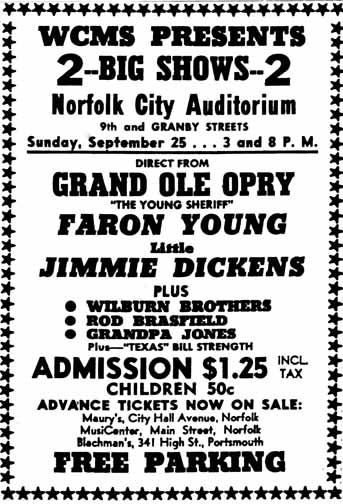
TBS was in Cincinnati on personals on September 27, 1955, visiting C&W DJs and music men to plug his new Capitol release, “Yellow Rose of Texas,” b/w “Cry, Cry, Cry.” He flew out that night for Memphis. (Billboard, October 8, 1955)
The Corpus Christi Caller Times of September 30, 1955, mixed all of its genres together on its charts, but TBS’s “Cry, Cry, Cry” was there, above a Dean Martin song.
October 1955
On October 13 – 15, 1955, TBS participated in the opening of Memphis’ newest and one of the Mid-South’s largest and most complete shopping centers, the Park Shopping Center, at Park and Getwell. The first six stores staged a jamboree inaugural with top stars of the radio and television musical world, starting with Texas Bill Strength from 9 to 10am for each of the three days. Bill was described as
the popular country disk jockey and artist on radio station KWEM, where he ranks among the top platter spinners. Out of more than 1,800 deejays in the nation, Billboard ranks him No. 50. He lives in Memphis with his wife, Dorothy, and three little Strengths, Dale, Bobby and Sandra.
(Memphis Commercial Appeal, Thursday, October 13, 1955)
On October 21, 1955, TBS and his band were scheduled to entertain at the Kennedy Veterans Hospital with a variety show. It was one of three projects supported by the Armed Forces Officers’ Wives Club of Memphis. (Memphis Commercial Appeal, Friday, October 21, 1955)
TBS’s recording of “Yellow Rose of Texas” was No. 4 in the Cincinnati C&W market. (Billboard, October 22, 1955)
Johnny Cash’s version of “Cry, Cry, Cry” is only now beginning to shape up as a left-field threat. Starting off nicely in the Nashville and Memphis trade areas, it has continued to grow there and has begun to spread. Richmond, Dallas, New Orleans and Little Rock are other territories where Cash has now established himself. TBS’s version is also a good seller in a number of key spots. (Billboard, October 22, 1955)
On October 23, 1955, “Grand Ole Opry TV Stars” gave two performances to good houses at the Memphis Auditorium in the big North Hall. Sponsored by Bob Neal, the show featured:
- Jimmy Dickens and his Country Boys
- Moon Mullican, the Hillbilly Liberace
- Rod Brasfield, Comedian
- Jean Sheppard
- The Wiburn Brothers
- Hawkshaw Hawkins
- Eddie Bond
- TBS
- Ray Price and the Western Cherokees
Faron Young was scheduled to appear, but was hospitalized in Albany, Georgia with hepatitis. (Memphis Commercial Appeal, Sunday, October 23, 1955)

On October 28, 1955, TBS was scheduled to appear in Carrollton, Kentucky, with Jimmie Skinner and Hylo Brown. (Billboard, October 22, 1955)
On October 29, 1955, TBS was scheduled to make a return stand with “Circle Theater Jamboree” in Cleveland. (Billboard, October 22, 1955)
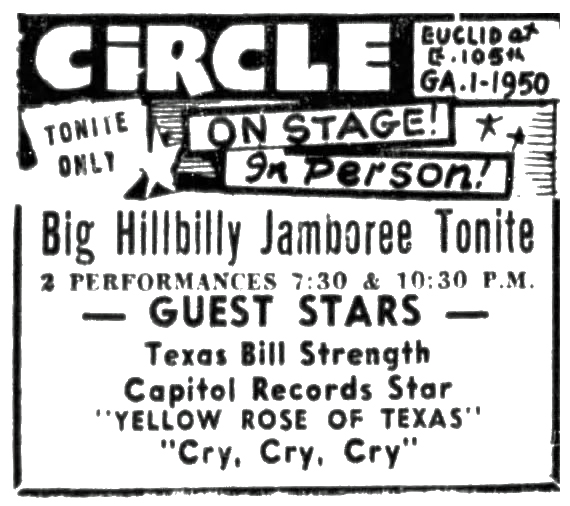
On October 30, 1955, TBS appeared at the Lyric Theater in Indianapolis for an “All Star Jamboree.” Billboard (October 22, 1955) reported that Dick Blake was the producer of the show. Other performers were:
- Martha Carson
- The (Bill) Carlisles
- Jim Wilson
- Sonny Grubbs
- Possibly Ferlin Husky, according to the Billboard blurb

November 1955
Billboard reported that on Saturday, November 5, 1955, TBS was to appear on the Pee Wee King TV show over WBBM, Chicago.
This is a head-scratcher.
The Pee Wee King Show apparently began broadcasting on station WAVE in in Louisville in 1949.
In Chicago it was shown on WBBM from October 11, 1952, to March 28, 1953.
In Chicago it switched to station WMAQ in April 25, 1953.
In Minneapolis, it was broadcast on KSTP starting on March 17, 1953.
An undated list of Bill’s performances says that he appeared on the Pee Wee King Show on station KMMJ-TV, Chicago.
Station KMMJ was in the middle of Nebraska somewhere.
Leave it to Texas Bill to leave us in a quandary!
On November 6, 1955, two shows were presented by Jimmy Skinner and Lou Epstein at Emery Auditorium in Cincinnati. Performers included:
- Pee Wee King and Band (RCA Victor)
- The Stanley Brothers (Mercury)
- TBS (Capitol)
- Jimmie Skinner (Decca)
- Jimmy Williams (MGM)
- Hylo Brown (Capitol)
- Betty Foley (Decca)
- Bonnie Sloan (Columbia)
- Neal Burris (Columbia)
- Ray Lunsford (Excellent)
- Fiddlin’ Red Herron (King)
- Natchee the Indian trick fiddler
- Little Eller Long
- Red Murphy
- Roy Moss
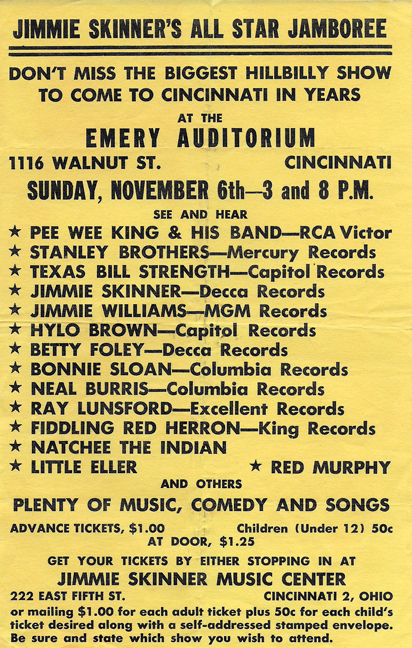
Jimmie Skinner was the emsee. The big show was touted via five Cincy radio and TV outlets. It marks the first C&W talent brigade to play a Cincinnati theater in many years. Reported in Billboard November 5, 1955. On November 19, Billboard reported that 4,800 ducats were sold for the 2,200-seat auditorium. SRO business was the order at both performances, with several hundred turned away at the matinee showing. The show got heavy promotion via five local radio and TV stations.
(Billboard, November 5 and 19, 1955)
The 1955 Billboard C&W Disk Jockey of the Year Poll put TBS at Number 26 out of 60. He was identified as working for KWEM. (November 12, 1955)
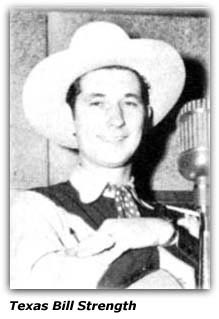
On November 12, 1955, TBS put an ad in Billboard, with a picture of himself and text that read (vertically – punctuation added)
THANKS Dee-Jays for every spin you gave me on Cry Cry Cry b/w Yellow Rose of Texas. Your Grateful Buddy, Texas Bill Strength, exclusively on Capitol Records. Hope you like my brand new release, “Turn Around” b/w “When Love Comes Knockin’” Congratulations, WSM, on your 30th Anniversary. Glad to be here. Texas Bill Strength, Station KWEM, Memphis, Tenn. Phone Mutual 5-8606. Member CMDJ. Represented by Miss Bobbie Bennett, 763 Gower Ave., Hollywood, Calif. Hollywood 9-5891.
FAREWELL TOUR
On November 13, 1955, TBS made his final appearance in Memphis at the Ellis Auditorium. It was a farewell tribute to TBS, who announced to the crowd that he was moving to Minnesota to introduce Yankees to country music. The concert, which lasted between 3 and 8 pm, was the first of a six-day tour. Performers at the concert were:
- Hank Thompson
- Charline Arthur
- Elvis Presley
- Carl Smith
- Carl Perkins
On November 14, 1955, the Memphis show from the night before was repeated in Forrest City, Arkansas.
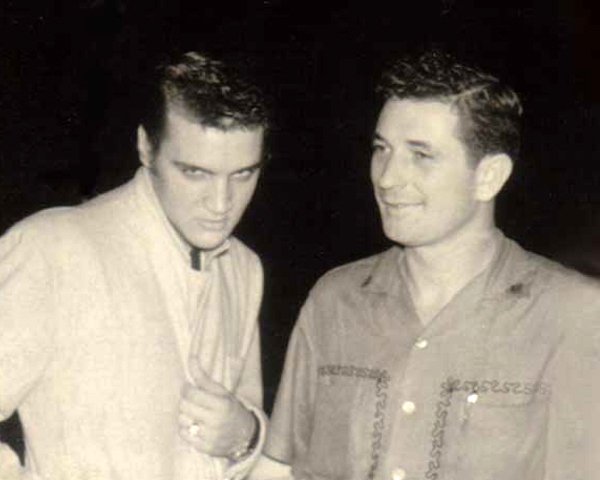
The tour was promoted by Bob Neal, Presley’s personal manager. Strength has just given up his deejay chores at KWEM, Memphis. (Billboard, November 6, 1955)
On November 29 and 30, 1955, TBS was scheduled to guest star on “Hometown Jamboree,” Houston. Whether this was a radio or TV show is unclear. (Billboard, November 12, 1955)
